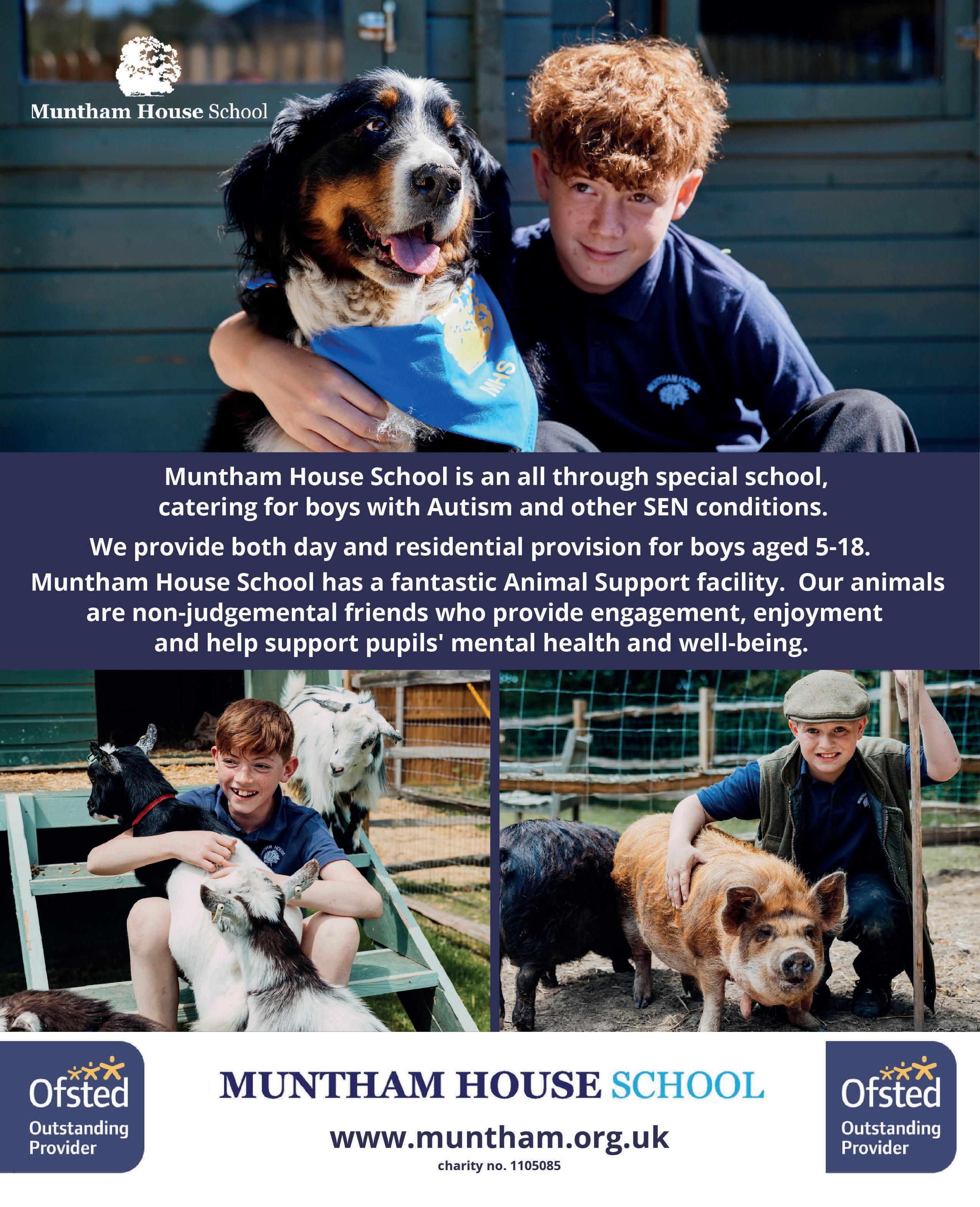

YOUR
tips, dealing with puberty, and our art
Plus
menopause How autistic people experience it Special interests Why they matter Willard Wigan Making the world’s smallest art
Winter 2022
Christmas
competition winner revealed
The
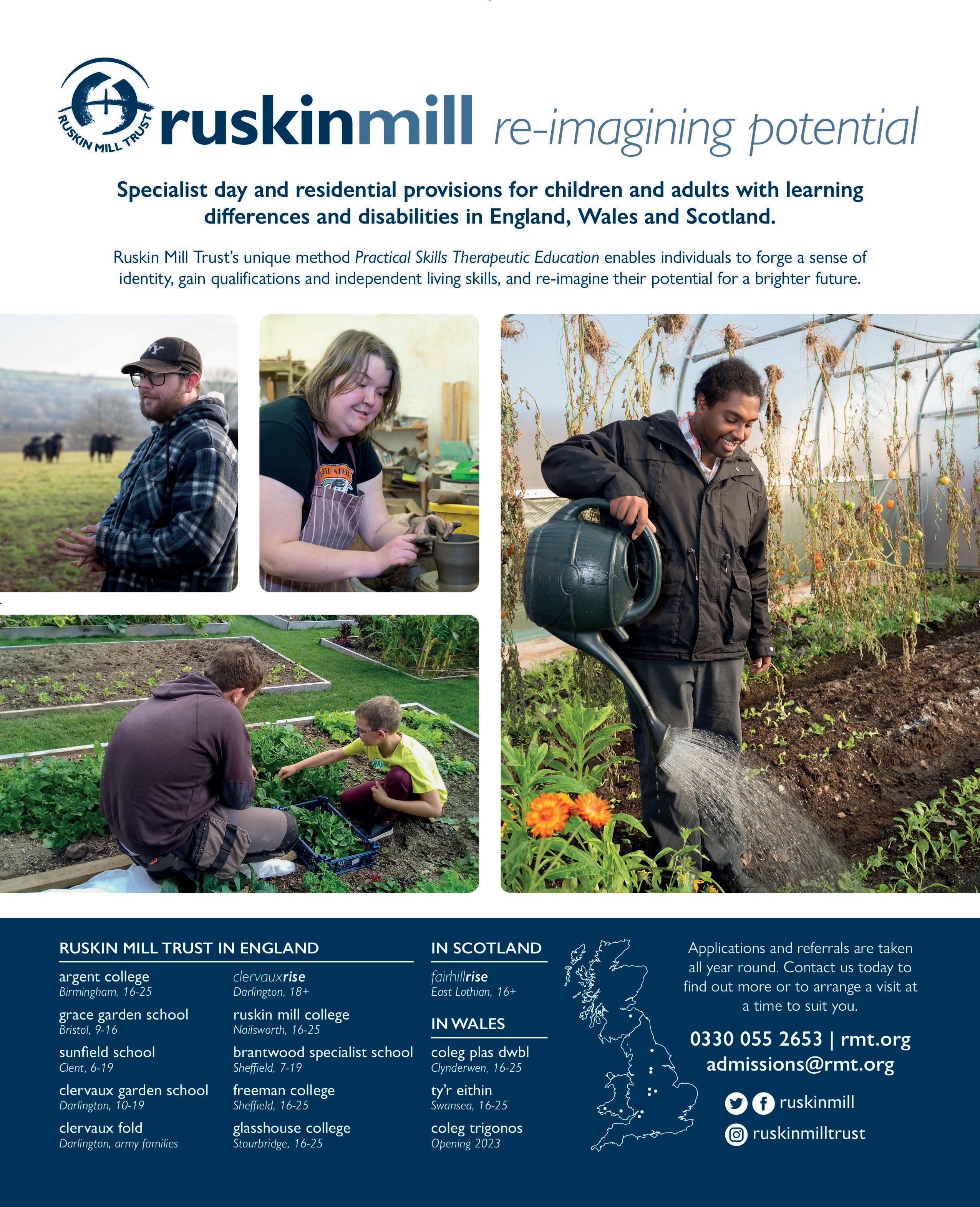
EDITOR
Suzanne Westbury
YourAutismMag@nas.org.uk
CONTRIBUTORS
Frances Hutchman
HEAD OFFICE
National Autistic Society
393 City Road London EC1V 1NG Tel: 020 7833 2299 www.autism.org.uk
SUPPORTER CARE TEAM 0808 800 1050 membership@nas.org.uk
ADVERTISING
James Pembroke Media Tel: 0203 859 7098 hoby.abdel@jamespembroke media.co.uk

SUBSCRIPTIONS
Only available to members of the National Autistic Society. To join, visit www.autism.org.uk
DESIGN AND PRODUCTION
CPL (Cambridge Publishers Ltd) 01223 378000 www.cpl.co.uk 1 Cambridge Technopark, Newmarket Road, Cambridge CB5 8PB
PRINT
Warners Midlands 01778 391000
National Autistic Society is a charity registered in England and Wales (269425) and in Scotland (SC039427) and a company limited by guarantee registered in England (No.1205298), registered office 393 City Road, London EC1V 1NG
© Your Autism magazine
Winter Vol 56, No 4
National Autistic Society ISSN 2055-0413
The views expressed in Your Autism and any enclosures or advertisements are not necessarily those of the National Autistic Society. In the interest of providing readers with the widest range of information, we may include details of some of the many approaches to autism. However, this does not imply our charity’s endorsement of any particular approach or product. The inclusion of a website does not necessarily imply that our charity endorses or supports the group or individuals running the website, nor does the absence of a website imply that our charity does not endorse or support the group or individual running the website.
Contents
What’s new
A round-up of the latest news
The big draw
We announce the winner of our 60th anniversary art competition
My diagnosis
Charlie McEvoy tells his story
Real life
Willard Wigan, the world’s greatest micro-sculptor
How Mandy set up a family branch in Weston-super-Mare
Comic relief
Sam’s design work and cartoons
Not just a hobby Why special interests need to be cherished
Breaking the taboos Why we need to talk about autism and menopause
Readers to the rescue Dealing with meltdowns
What to do if your child has contact with police Here’s how you can help
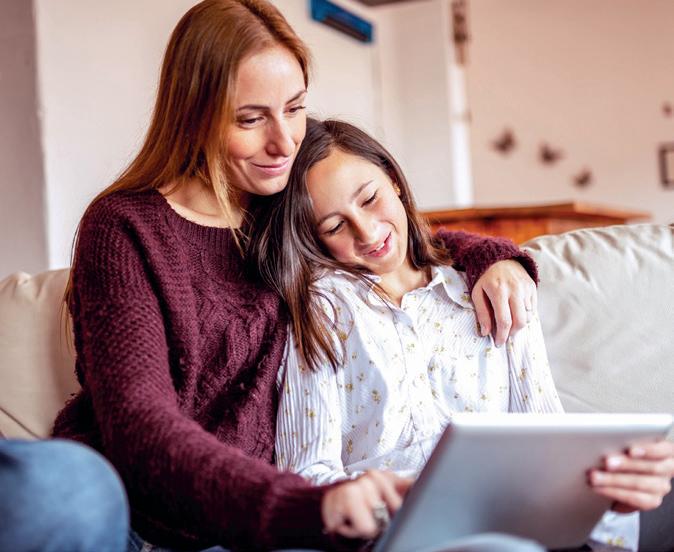
Preparing for puberty How to get your child ready Notebook Things to read, do and see
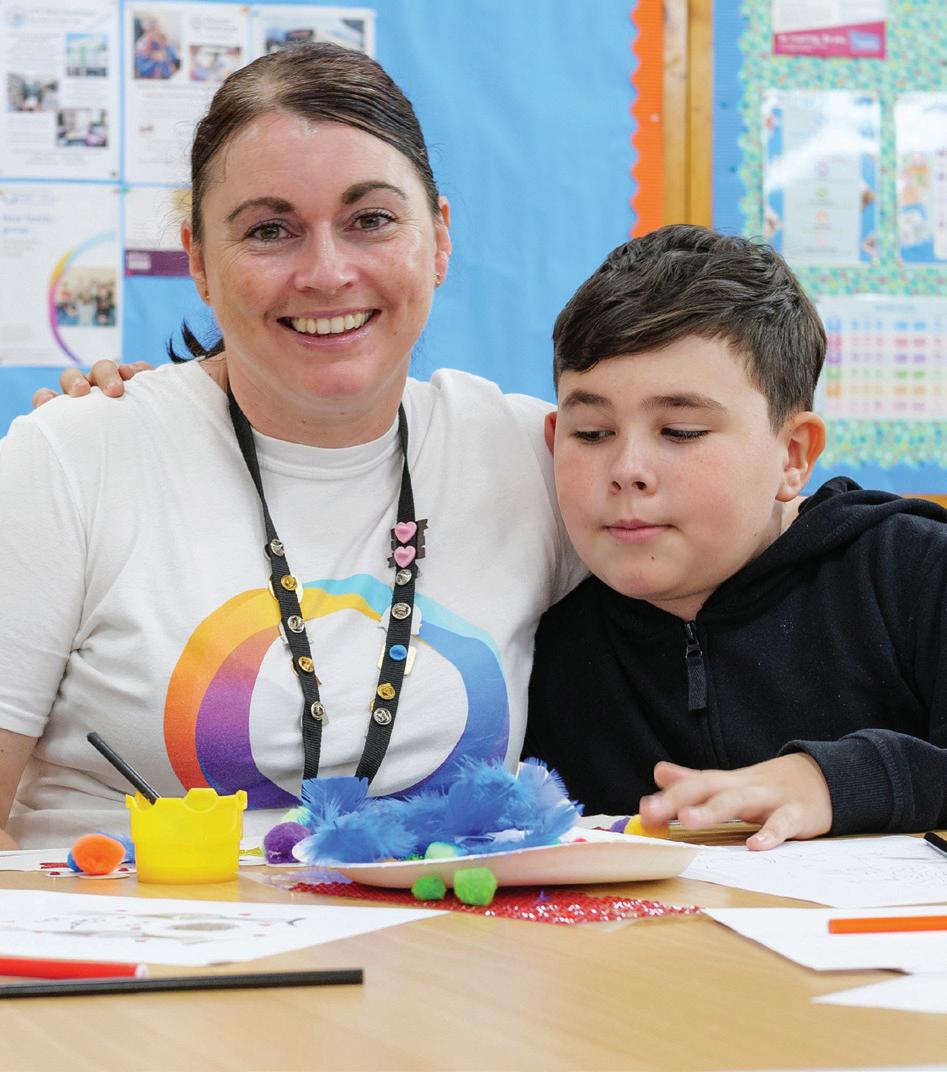
Winter 2022 3
“Everyone is welcome to be themselves”
“An autistic person who is a victim, witness or offender is entitled to support”
Winter 2022 YOUR 04 08 11 12 16 20 22 26 30 32 34 38 32 Prepare for puberty Family time 16 34 Menopause 26
What’s new?
Our round-up of the latest news and views
World Autism Acceptance Week 2023
Our flagship fundraising campaign, World Autism Acceptance Week, will be a special one next year.
It will take place from 27 March to 2 April, 2023. There will be a virtual colour-themed Super Spectrum Challenge, a new in-person event called Spectrum Colour Walks, and plenty of new resources and support for all individuals, groups, schools and workplaces taking part.

This campaign gives everyone a chance to feel heard, valued, embraced and part of the solution.
By taking part and raising vital funds to support our work, you
have a direct impact on those who really need us.
Every penny raised enables us to carry out our vision to transform society and deliver our ambitious plans in the future. Please save the dates in your diary – especially
if your events involve a bit of forward planning.
Join us in making 2023 the most colourful campaign yet.
To find out more about our new theme and events, visit autism. org.uk/waaw2023
Now I Know campaign
Our new campaign features powerful photography of six autistic women and non-binary people. They were photographed by Alex Heron, an autistic photographer from Rankin’s team.
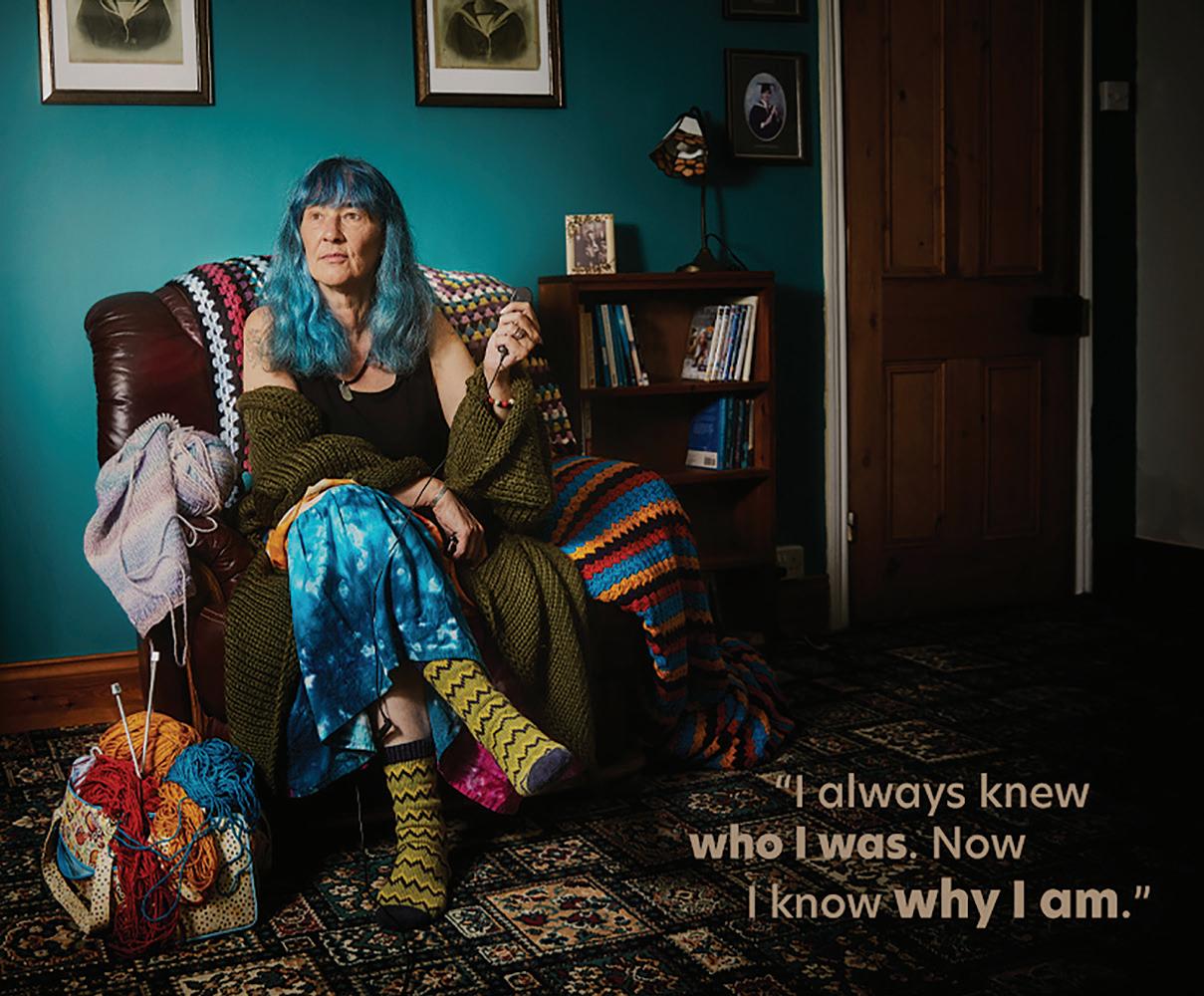
The campaign aims to amplify the voices of autistic women and non-binary people, and improve understanding of autism and late diagnosis. It was inspired by the words of Dawn (pictured, left), diagnosed aged 56. She said: “I always knew who I was, now I know why I am.”
Share your story using #NowIKnow and find out more at autism.org.uk
4 Your Autism
Get in touch!
Lack of support in the criminal justice system
Our charity has published new research highlighting a lack of support for young autistic people in the criminal justice system, and what needs to change.
The report, “My life could be so different”, shows a significant gap in understanding of the support needs of autistic young people throughout the criminal justice system, from police to probation, young offender institutions and prison.
More than 500 people responded to our survey, including autistic adults reflecting on their experiences as a young person, family members, and criminal justice professionals.
The report shows how early, preventative support is vital for autistic young people at risk of entering the criminal justice system. Families and professionals had concerns about autistic young people being easily led or influenced by peers, violence or aggression towards others and being excluded from school.
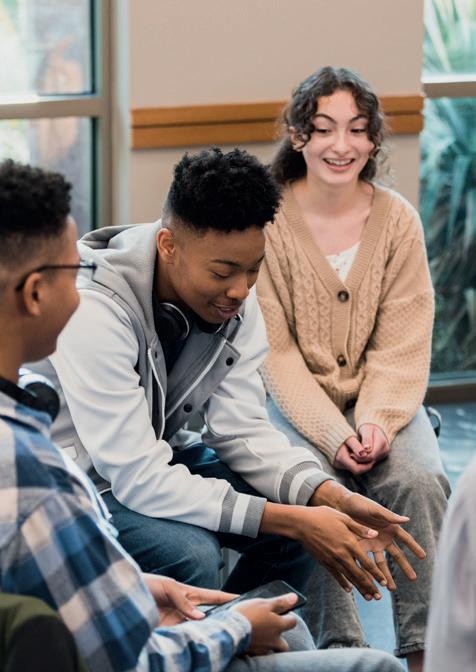
The report also highlights a lack of support for autistic young people once they are in the criminal justice system. Nearly three-quarters of criminal justice professionals who responded to the survey believe processes for identifying autistic offenders are ineffective. In most cases, both autistic adults
and families said they received no reasonable adjustments from all sections of the criminal justice system.
We are calling for mandatory autism training across the criminal justice system and more support to tackle early concerns of autistic young people.
Clare Hughes, Criminal Justice Manager at our charity, said: “No autistic child or young person should be at greater risk of being in the criminal justice system just because they are autistic. But our research shows the impact can be devastating when it happens.
“There needs to be better understanding of autism and support for autistic young people in every part of the system. The right early support must also be available to stop autistic young people from entering the system, including mental health support to navigate what can feel like a chaotic and overwhelming world.
“Staff working in the criminal
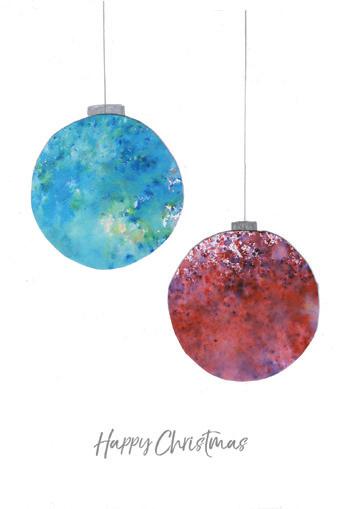
Your free pack of Christmas cards
Once again, we are offering our life members a free pack of Christmas cards to send to your loved ones. To claim your pack, just call the Charity Card Shop on 01227 811 667. Alternatively, you can visit our dedicated page at charitycardshop. com/nas and click the ‘Life Member’ login button. You will need to quote your Unique Life Membership Number, so please have this ready when ordering.
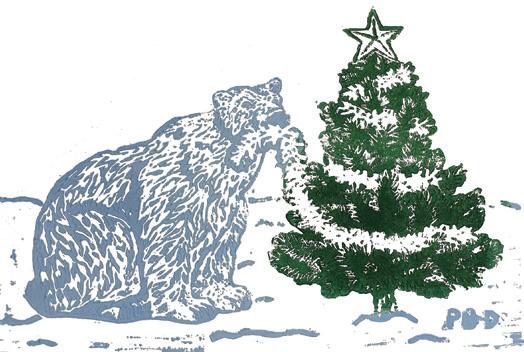
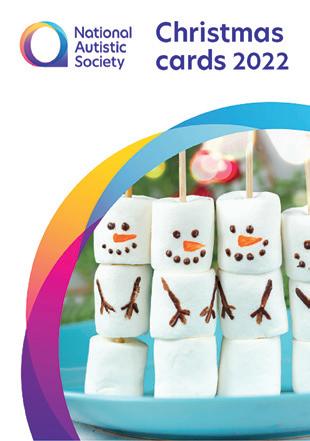
justice system must be supported to understand how to meet autistic young people’s needs. Autistic young people have already been failed by entering the system in the first place, there is no excuse to fail them further.”
Read the full report at
autism.org.uk/youth-justice
Our article on page 32 explains what support autistic people are entitled to from the police.
“My life could be so different” Experiences of autistic young people in the youth justice system
Winter 2022 5
News
Diary dates
What to do and where to go
7 December 2022
Starshine carol concert: St Clement Danes Church, London
Join us for an evening of Christmas carols and festive cheer, featuring the EC4 Music choir and celebrity guests. Book your tickets at autism. org.uk/starshine
2 March 2023
Annual professionals’ conference
Live online Hear from a range of expert speakers on masking, diagnosis, mental health, wellbeing in school and later life experiences. Book at autism.org.uk/ professionals-conference
27 March to 2 April 2023
World Autism Acceptance Week
Start planning your activities now! For inspiration, see page 4.
2 April 2023
London Landmarks Half Marathon
If you are looking for a unique race, join us at the London Landmarks Half Marathon 2023. Live music, theatre performances and iconic London landmarks along the route! Find out more at autism.org.uk/ landmarks
23 April 2023
TCS London Marathon 2023
Apply to be part of Team Autism at one of the world’s most popular marathons and help to create a society that works for autistic people. Apply at autism.org.uk/ londonmarathon2023
Spreading the word through art
Our member, autistic artist James Owen Thomas, has designed a new set of Picture Exchange Communication System (PECS®) symbols on protecting the environment and helping stop climate change.
James, pictured above, told us: “I started using PECS when I began school. They helped with my communication and understanding of others. I hope that the symbols I’ve designed will spread a message to people of the need to protect our environment for a better future.”
James uses recycled materials in his artwork to create vibrant collages that depict the natural world. In 2021, he was chosen by the Prime Minister’s Office to be a One Step Greener Ambassador for COP26 in Glasgow. Meanwhile, James was on Gardeners’ World recently, talking about being autistic, feeling anxiety and stress daily, and the benefits of being out in nature. After seeing him, a family got in touch about their four-year-old autistic son, who is non-verbal. James told us: “He loves birds and his favourites are pigeons, so his family wanted to buy him my Pigeon at Home original. It makes me feel very happy that my artwork can give him some enjoyment, perhaps make him feel calmer in some way.”

The PECS® symbols are free to download at pecsunitedkingdom.com/environmentthemed-pecs
See James’ artwork at jamesowenthomas. com and watch him on Gardeners’ World (from 50 minutes) at bbc.co.uk/iplayer/episode/ m001c2q4/gardeners-world-2022-episode-26
6 Your Autism
•
Annual professionals’ conference







•
•
•
•

The

that works for
people
March
A society
autistic
2
2023, online Key topics include:
supporting people with complex communication difficulties
autism, ADHD and executive functioning
the experience of Black autistic women
National Autistic Society is a charity registered in
and
England
Wales (269425) and in Scotland (SC039427)
Professionals:
£195
people and their
Ticket prices Book your place
Autistic
families or carers: £65
www.autism.org.uk/professionalconference2023
The big draw
The time has come to announce the winner of our 60th anniversary children’s art competition!
The winner - High five to the big 60!

8 Your Autism Art competition
Runner-up: The wonder stones
Congratulations to Conisborough College Resource Base for their winning entry, High five to the big 60!
Anne-Marie Juniper, Resource Base Teacher at the college, said: “We are a small resource base for autistic students in an inner-city London school. We thought about a group entry where each student could express themselves openly and freely on their experience of autism to celebrate the National Autistic Society’s big 60. Students across years 8-10 worked on this entry.”
Congratulations to all the artists: Deshawn, Precious, Tonna, Saranja, Elijah, Rafael, Cairo, Cheniqua, Cheiquan, Zian, Zoe, Victory, Kamal, Wasy, Andre, Sammy, Marvin and Allassane.
Runners-up
The wonder stones
By George
George said: “We are all different, unique and we see everything around us differently. These stones brought this feeling and sentiment to life because they all seem to have their own unique characteristics.”
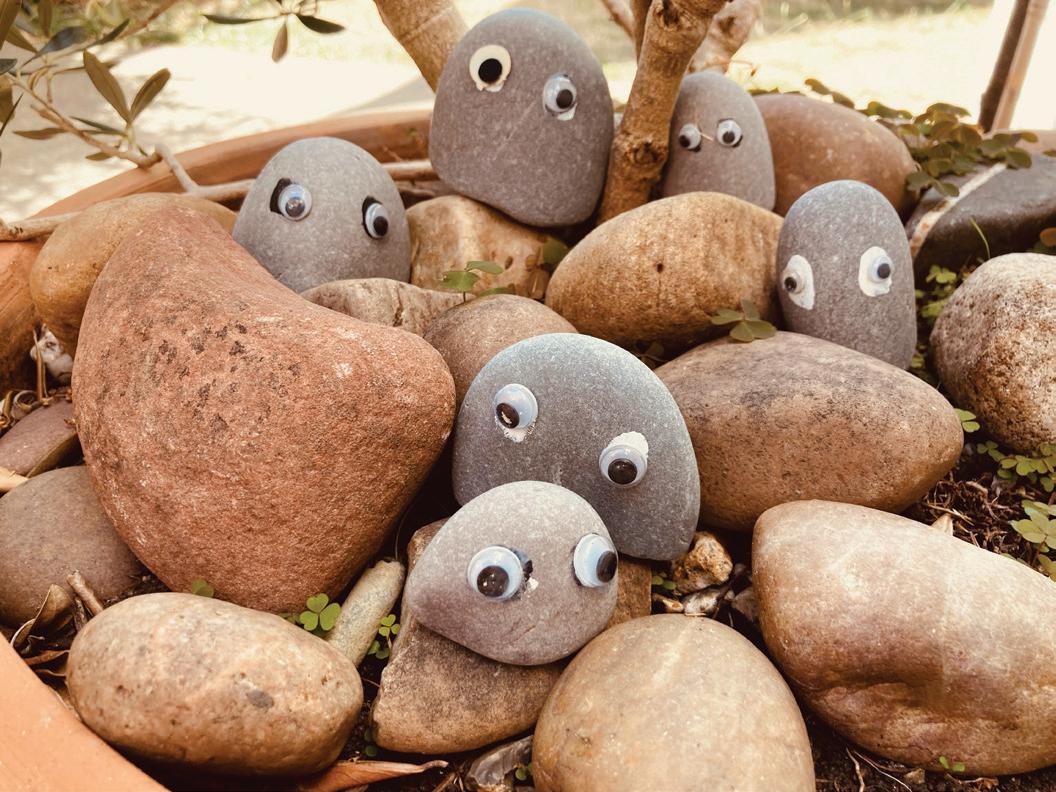
The right and left of the autistic mind
By Abdulla Abdulla said: “My art was inspired by how I think.”
Runner-up:
The right and left ofthe autistic mind
Thank you to everyone who entered. We loved seeing your artwork and the creative ways you chose to celebrate our charity’s anniversary.
The competition was judged by autistic artist David Downes, and our charity’s Interim Deputy Head of Marketing, CRM and Web, Fiona Grace. They chose their top three children’s and adult entries before they were put to the vote on social media.
To see the winners of the adult competition, visit the Spectrum magazine at autism.org.uk/ thespectrum
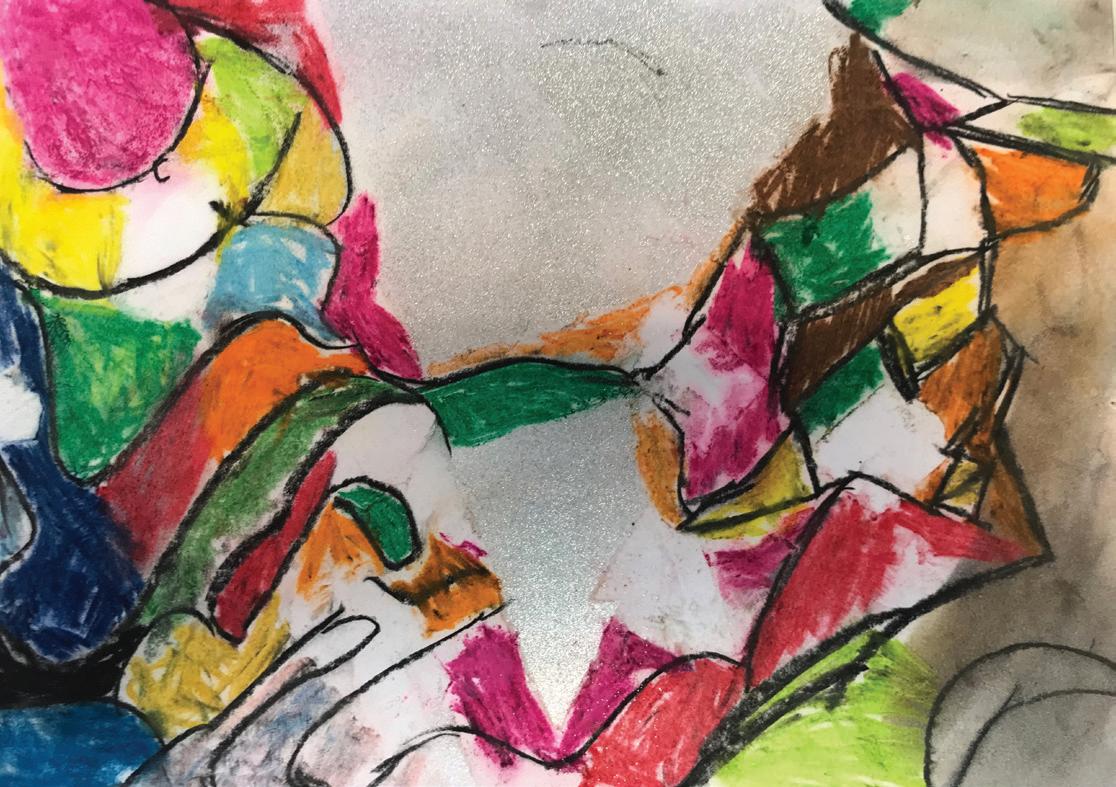
Art competition Winter 2022 9
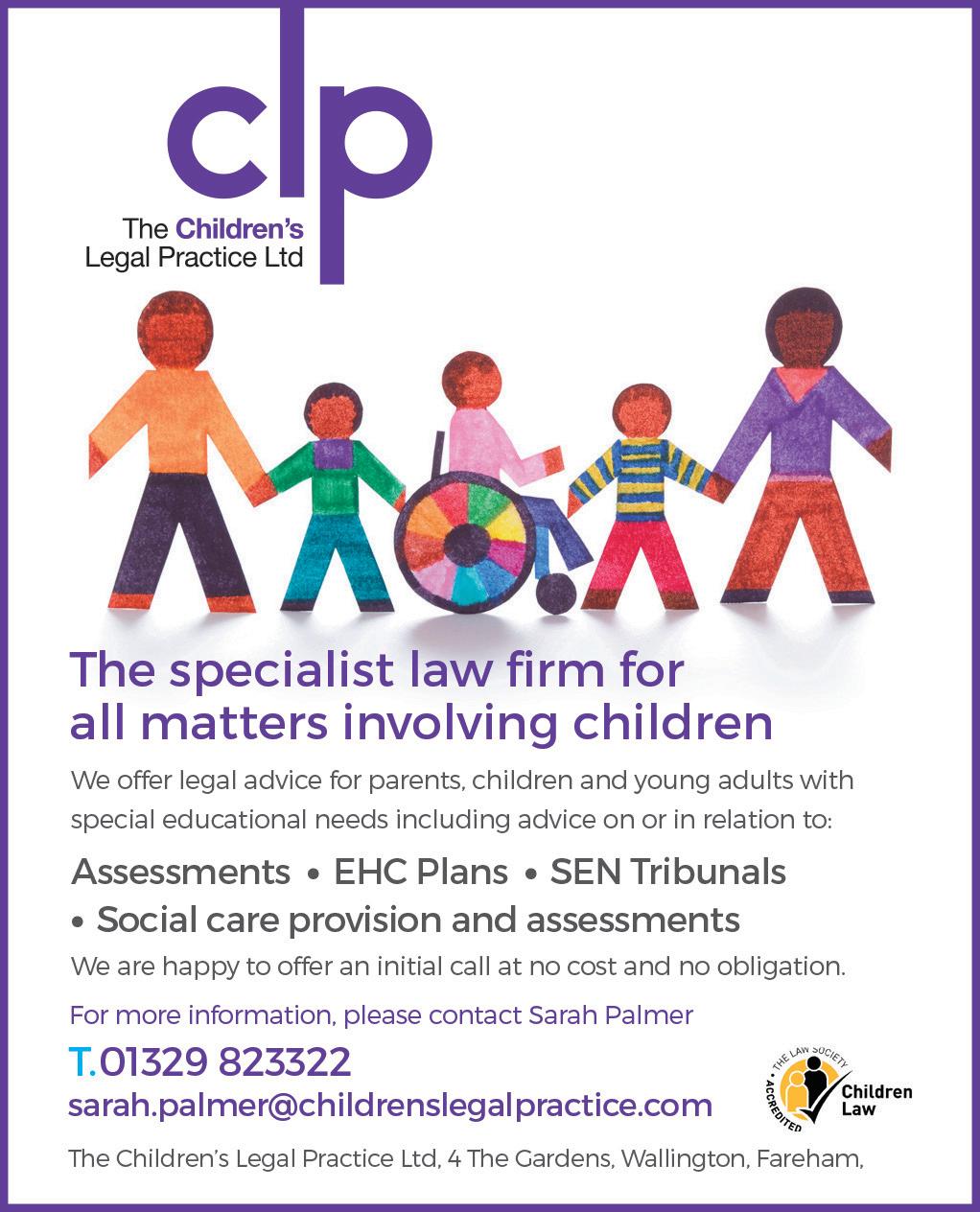
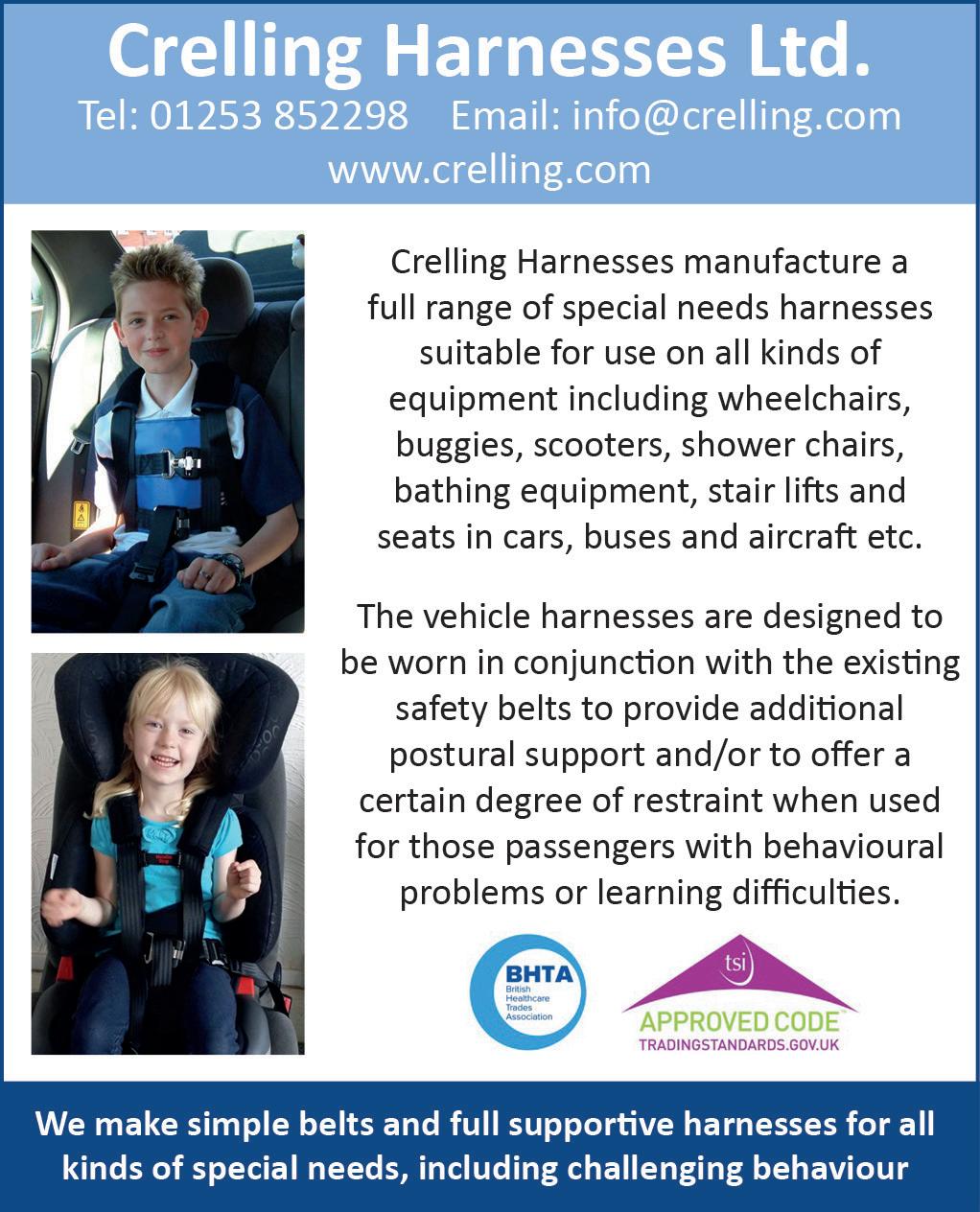

“I just did not mix with any children”
When I was six years old, my mum noticed I was always on my own in the school playground. I just did not mix with any children. Eventually, after many tests and doctor appointments, doctors concluded I was autistic. Being so young, I did not understand what was going on.
I was moved to a special needs school, and one of the first things I noticed was that every child had different problems.
My greatest memory of the school was the swimming pool. My teachers taught me to swim and I felt very confident in the water. My dad used to say that I could swim better than a fish.
When it was time for me to go to secondary school, my parents chose a special needs school in north London. It was at this school that I met my two lifelong friends, Robin and Kevin.
They are both autistic like me, and we have so much in common. We understand each other.
In 2006, I began to write stories and, about five years ago, I started to put
them on a fan fiction website. One of these stories has attracted more than 7,000 viewers!
In 2011, I was staying at my dad’s when he had a massive heart attack. I was very scared, but I managed to call 999 and keep my dad talking until the ambulance arrived. Dad slowly recovered and he is always grateful for what I did that night.
Next month I’ll be 32. I live in a care home and all my housemates and staff help me. I visit my dad at weekends and he is always there for me.

I know I’m autistic and mixing with other people is hard, but when I’m with my friends, Robin and Kevin, it just feels so normal in this abnormal world.
Want to share your or your child’s diagnosis story? Email YourAutismMag@nas. org.uk
Charlie McEvoy was diagnosed when he was six, and afterwards made lifelong friends at his special needs school
My diagnosis Winter 2022 11
“Humanity underestimates what autistic people can do”
Dr Willard Wigan MBE, the world’s greatest micro-sculptor, shares his inspirational story
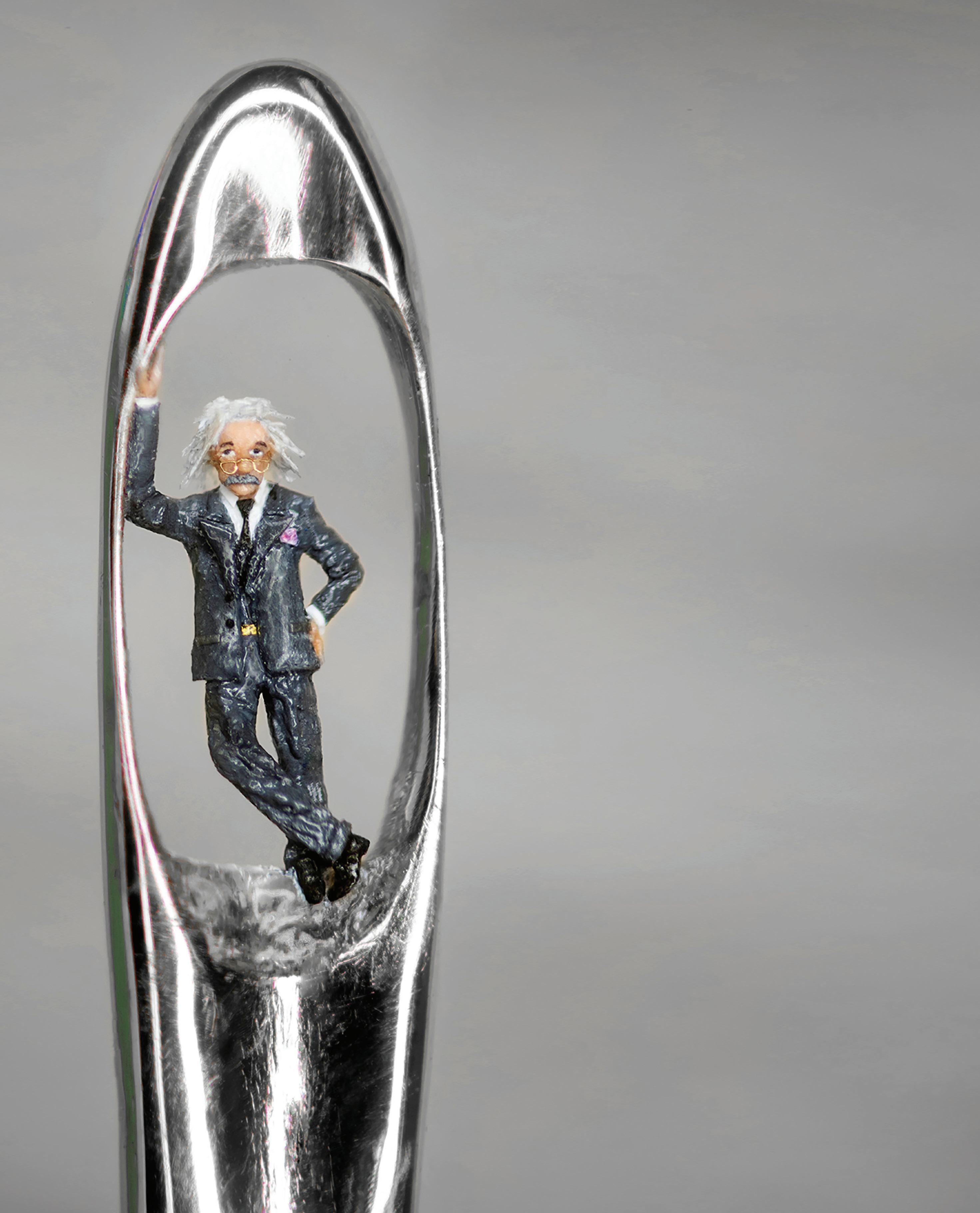
School crucified my confidence, because my teachers didn’t understand that I was different. I had a learning difference, but it was the 1960s and it wasn’t recognised as autism.
I couldn’t read and teachers would exhibit me around the school as an example of failure. One teacher would say: “If you don’t listen to the teacher, you become Willard.”
I felt like a leaf in a cul-de-sac, a piece of litter on the floor. It felt pointless to talk, so I stopped. At school, I looked out of the window and found entertainment in the birds flying around. The teacher would make me stand at the back of the classroom. Actually, that was quite nice because I could see little spiders climbing up the window ledge. To me it was a pleasure and not a punishment. They made a bad mistake there!
I would run away from school and hide in our garden shed. One day, our dog disturbed an ants’ nest. I was upset because I thought the ants would have nowhere to live. I started to make the ants another home, by carving wood and using dried grass. I even made them little tables and chairs and a merry-go-round. I kept thinking that the ants were going to be happy.
12 Your Autism
Real stories
One of the kids next door came home from school. She looked over the fence and saw what I’d made, and said: “That’s the bestest”.
When I heard that word, it was like being in a shower with each droplet of water washing away all the negative stuff that was said about me. The kid called her mum, and she said my ants’ home was fantastic. My mum came home from work and I thought she was going to tell me off, but she didn’t. She looked at what I’d made and was stunned into silence for a bit. She said: “You know, that’s really good. But if you make them smaller, your name will get bigger.”
My motivation
Now I was on a journey. At every opportunity I was making tiny little things, non-stop. People kept telling me I was “the bestest”. I was immune to the humiliation at school. Having autism, underestimation was my inspiration. It made me think, “I’m gonna show you what I can do.”
From the age of 15, I worked in a factory, drilling holes in bits of metal. I was earning money, but coming in from work, I would go up to my bedroom and keep making my mini sculptures. I invested in a microscope. One girlfriend said to me: “If you keep doing that, everybody in the world is gonna know about you.”
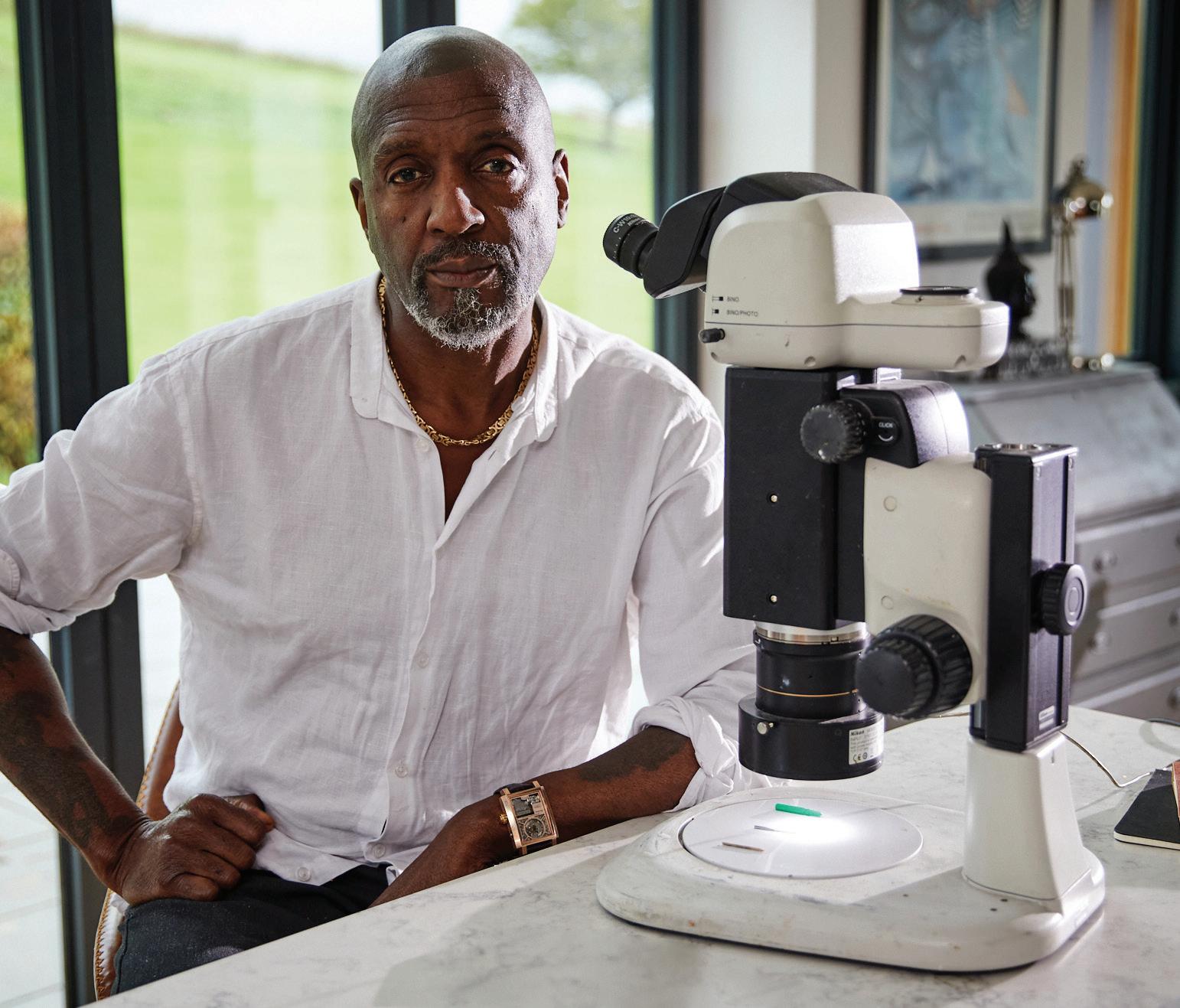
Fun facts
● Willard’s sculptures are typically placed in the eye of a needle or on the head of a pin.
● A single sculpture can be as small as 0.005mm.
● They can only be seen under a microscope.
● An eyelash is his paintbrush.
● He works 16-18 hours a day.
● Elton John, Simon Cowell and many others own his sculptures.
Years passed and I started to feel that something was missing in my life. But I couldn’t quite put my finger on it. I was a bit afraid to tell people I couldn’t read properly. I could talk and was articulate, though I couldn’t give eye contact.
Making it big
When I was 32, I was on the dole. Then one day my mum said: “Why don’t you show the world what you can do?”
I went into a shop in Birmingham called Ponds Tools and asked the owner if I could carve something out of the wood they had there. I said I would promote their tools. He said he’d never heard of me. I said you will hear of me if you let me carve something on that piece of wood. I showed him my carving of Peter Rabbit on a toothpick and he showed his wife.
So I would sit outside the shop and do my carving. A journalist came from the Birmingham Post to write an article about me. Then people started asking me to make them things and I was made an artist-inresidence at a shopping centre.
In my spare time, I kept mastering the small sculptures. Then, in 1999, Prince Edward
Real stories Winter 2022 13
Willard uses a microscope for his detailed work
married Sophie and I carved them in a match. I called it The perfect match. I was in The Sun, the Daily Mirror, The Guardian and even on The Big Breakfast TV show. They called me ‘Micro Angelo’. Then before I knew it, I became famous for what I do.


In 2007, I was made an MBE for my services to art. A tidal wave of success was coming from the little things I was making. In 2013, I achieved my first Guinness World Record for the smallest sculpture ever made by human hand. This sculpture was a 24-carat gold motorcycle placed within a drilled-out hair from my neck. In 2017, I broke my own world record when I carved a baby and placed it within a hollowed-out section of my own beard stubble. It is approximately the size of a human blood cell.
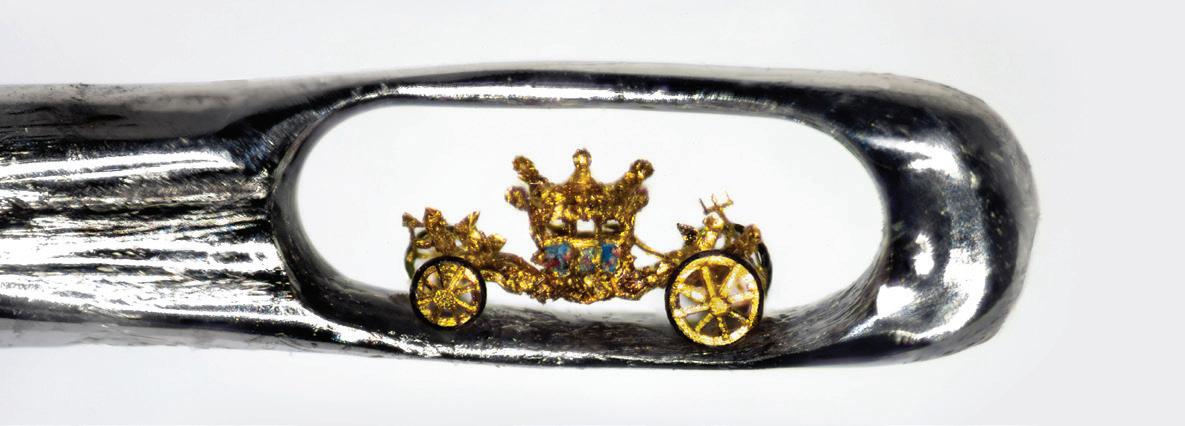
Anytime I made something, I was never satisfied with it. My mother’s words resonated in my head about needing to make things even smaller. If she’d never said that, I wouldn’t be as good as I am today.
A voice for others
When I was in my 50s, I was finally diagnosed as autistic. I then became a voice for people with learning differences.
If I wasn’t autistic, I wouldn’t be who I am today. Humanity underestimates what autistic people can do. Have a good look at
those people you think can’t do things. You’ll see the ‘diamond that’s in the dustbin’ that you never took time to see.
Autistic people are number one in the world when it comes to natural ability and talent. But there’s so much more to be uncovered. Autism should be embraced. Encourage autistic kids and let them know how great they are. I became an artist because of people telling me I was good at what I did.
And now? My little message has gone all over the world. The Queen owned one of my sculptures. She told me she’d never had something so small that’s meant so much.
People who think they have less can have so much more. When I first realised I had this talent, I thought, “they’re not going to deny me anymore from the past”. So that’s why I became who I am. I’m 65 years old now and I’m just going to keep getting better.
Willard is working with auticon, a global IT consultancy whose consultants are all autistic, to change perceptions of autism in the workplace. He is encouraging companies to realise that making small changes to standard practice, processes and work environments can empower neurodivergent people to thrive at work. See auticon.co.uk
14 Your Autism
Real stories
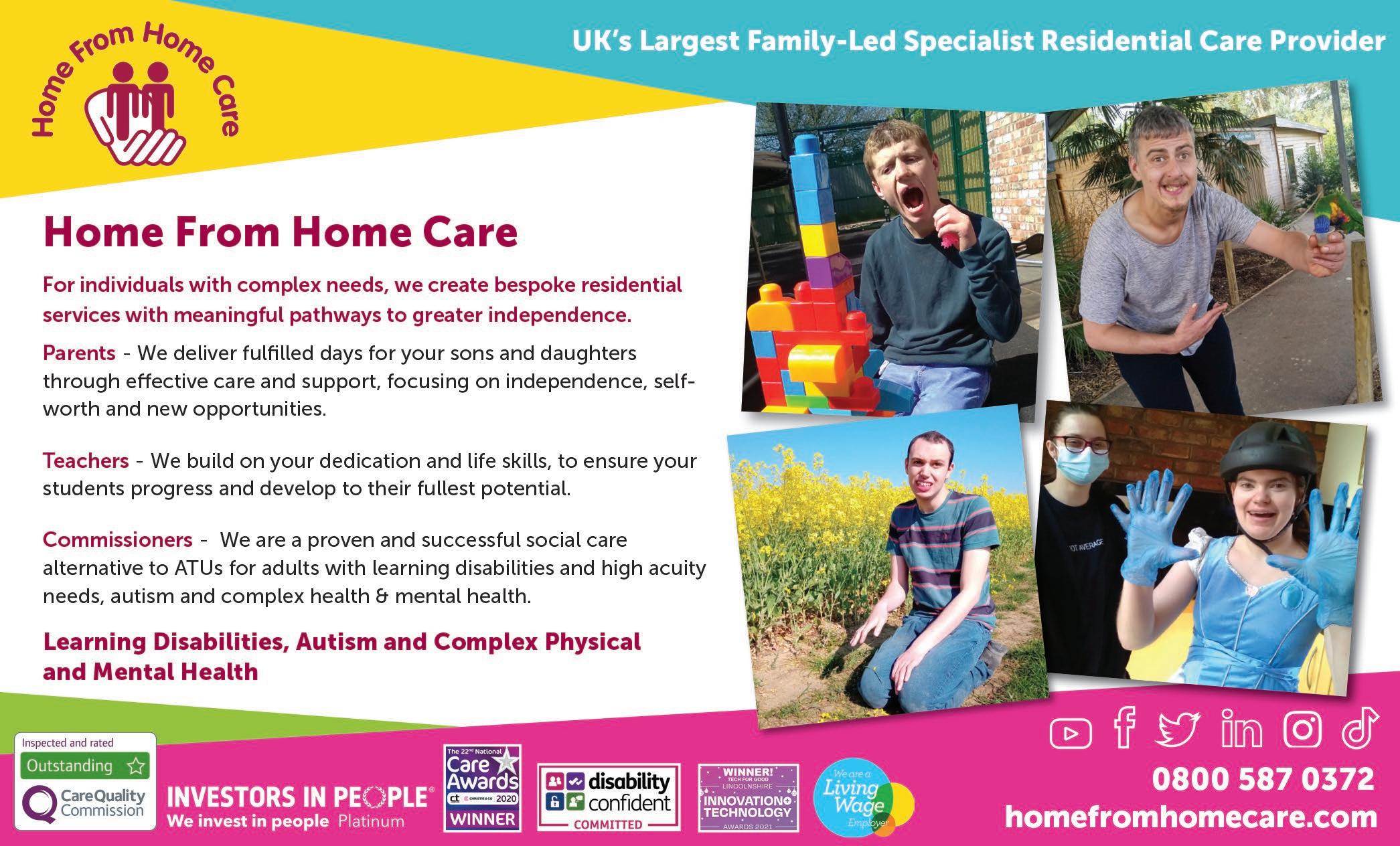
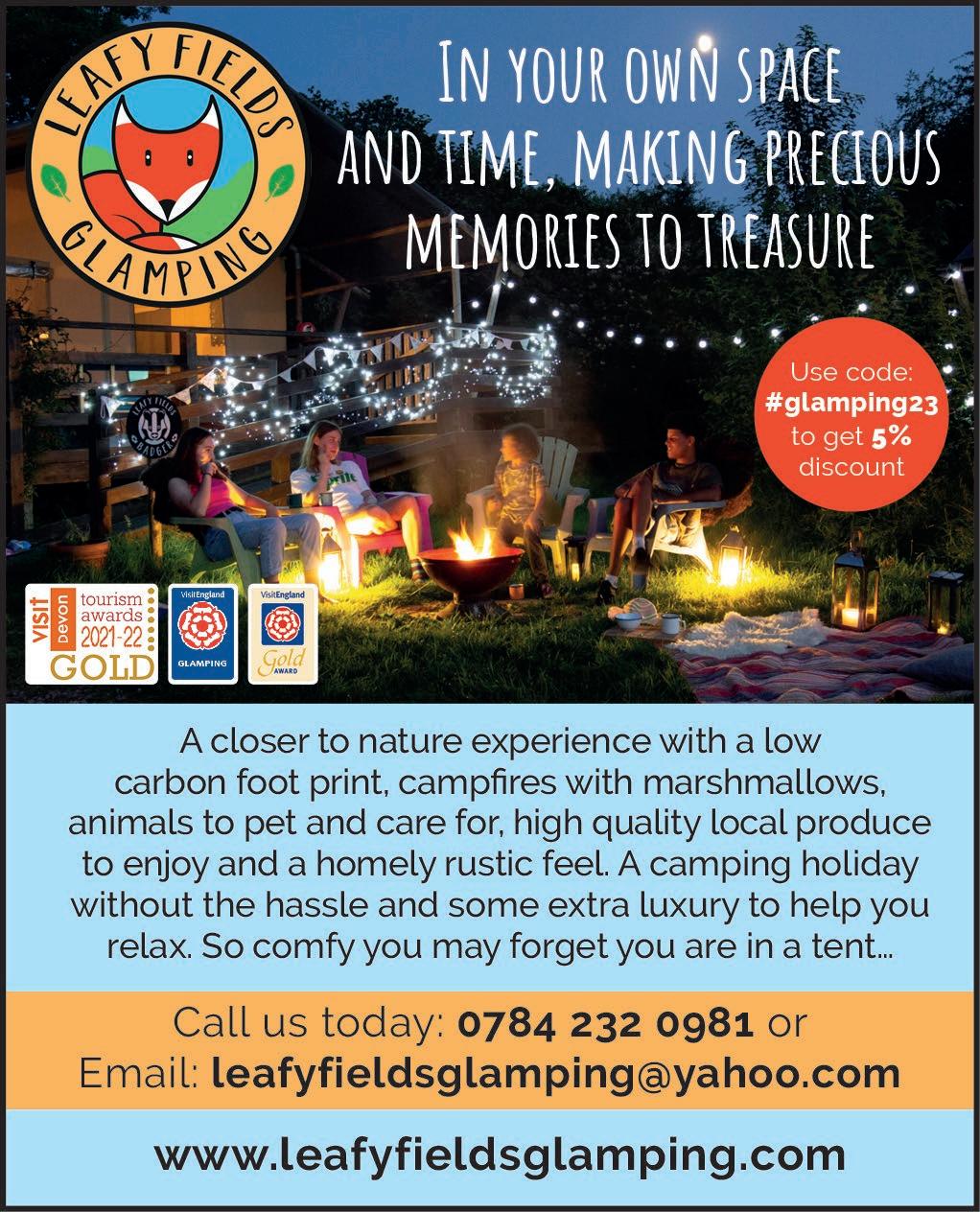

“Everyone is welcome to be themselves”
Mandy tells us about Zara and Ethan, who are both autistic, and how she set up a branch to give them a home away from home. We share some Christmas advice for families, too
Zara was diagnosed when she was 10 years old. It’s been tricky over the past three years, juggling hospital appointments and school alongside her eating disorder. Zara went to hospital education for a while and then she was home-schooled. Now she finally has a specialist placement. It’s 30 miles away, unfortunately, but we’re transitioning her in.
With Ethan, we thought he had differences from when he was about 18 months old. He was on a waiting list for 16 months for the autism hub to assess him. Ethan is now 10 and doesn’t have a choice of a secondary school; it’s wherever is available in the catchment area, but that might not fit his needs. We were refused a plan with the local authority, so I’m going to global mediation before it goes to a tribunal case.
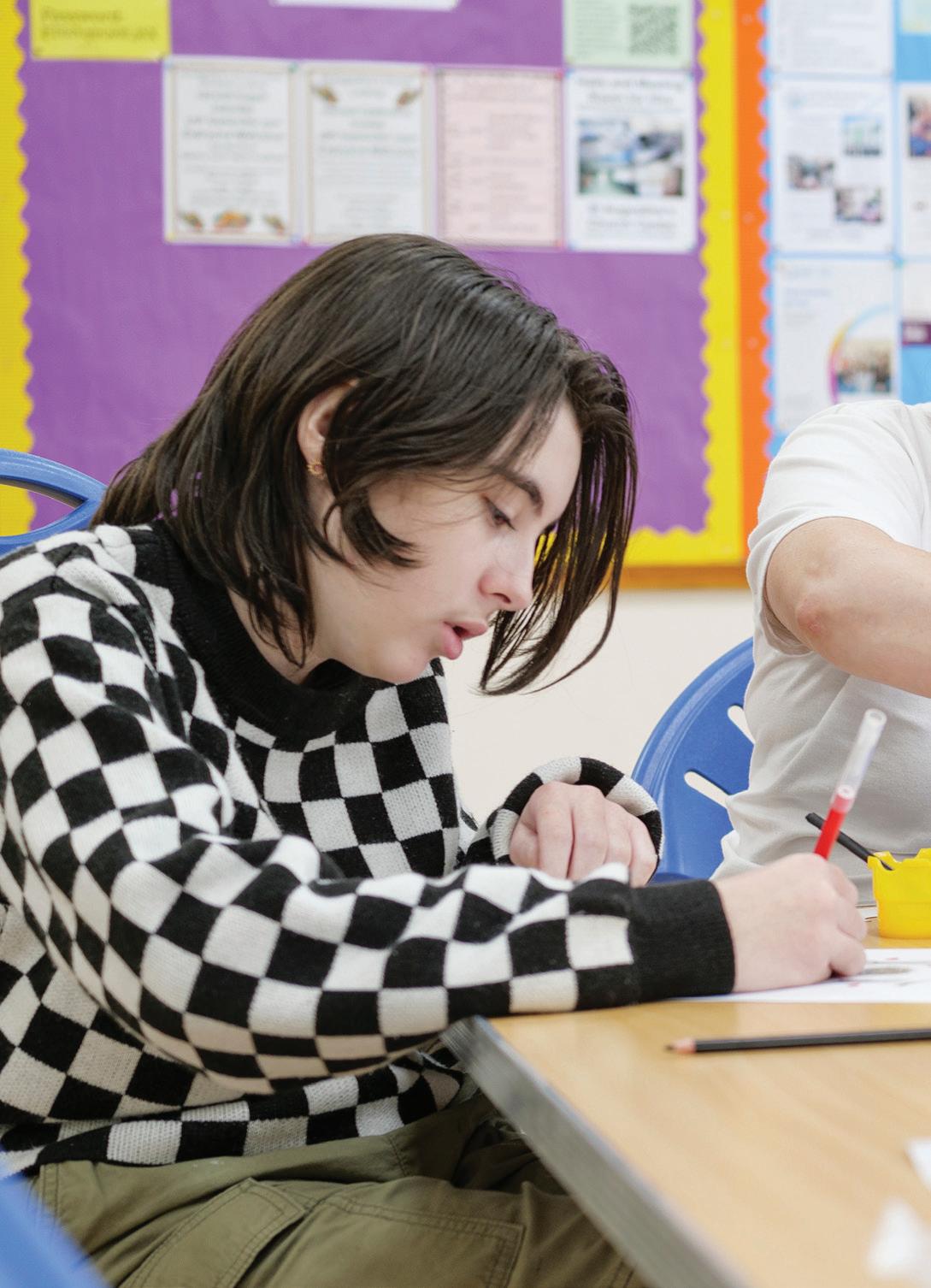
The past few years have been very difficult for me and my husband, Chris. I really needed to speak to someone who could understand, but there weren’t any support groups in my local area we could go to. Zara has separation anxiety and doesn’t want to leave me, but most groups for 13-year-olds are youth clubs and she’d have to go by herself. I can leave Ethan, but usually it was him who wasn’t allowed to be left and I needed to have Zara with me, too. So, I thought – why
don’t I start a group of my own? I can decide what we do and they can go together.
Taking action
I spoke to the National Autistic Society. They understood and gave me all the tools and training to help me set up a family branch in Weston-super-Mare.
I was warmly welcomed by Annie, the Branch Officer for South West England. She got me going with volunteering and training modules, and is always there if I need any extra support.
Now our branch meets twice a month, which gives us the routine and structure we need. It feels like a home away from home.
Through the branch, I’ve found people I can relate to, the advice I need and a safe space
16 Your Autism
Real stories
for my family. I’ve made amazing friendships. It’s nice to understand each other, to be able to appreciate when things are difficult, or when you’re having a good day. We will check in on each other if there’s an important event. We will ask ‘How are things today?’, or ‘How did so and so cope with this situation?’. It’s nice to share with other people.

The branch is so important to Zara and Ethan. Zara doesn’t usually like to leave the house, but she has started connecting with others at our branch. She often struggles with socialising, so to see her forming friendships fills me with joy and a sense of profound relief, knowing she is going to be OK. Now, Zara will come up with suggestions for craft activities, such as painting and decorating glass jars. It gives her confidence
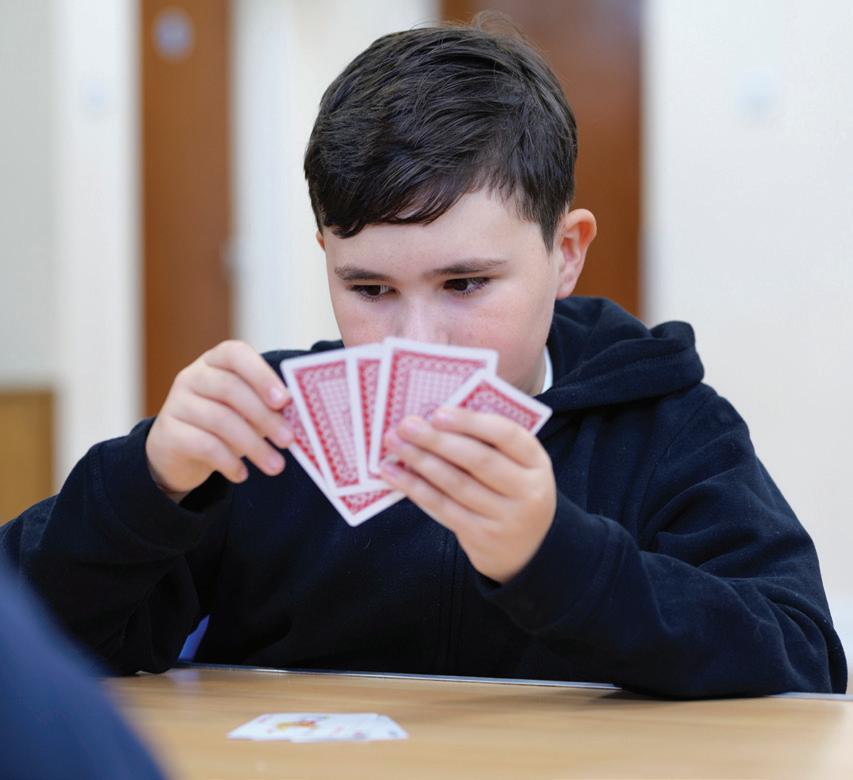
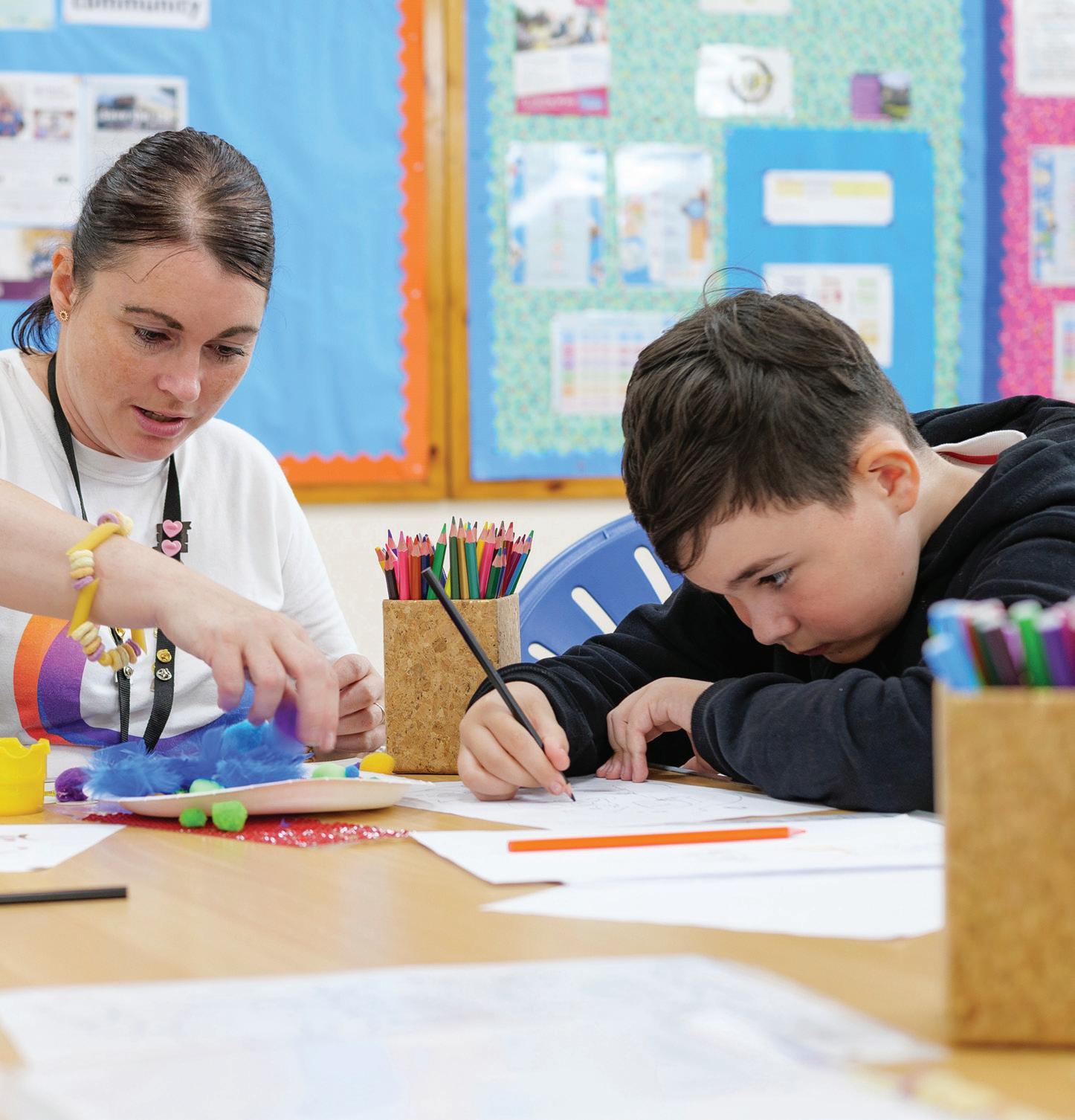
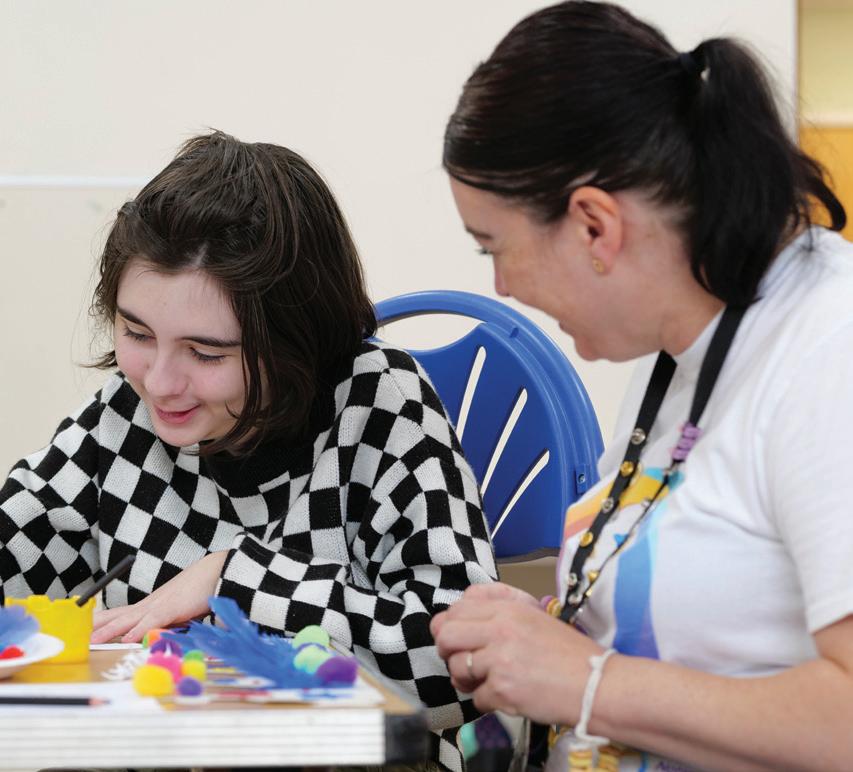
Real stories Winter 2022 17
Christmas tips
● Think about ways you can enjoy the festive season that work for you or your children – don’t feel pressured into doing things just because that’s what other people do.
● Share all plans so you all know what you will be doing and when, and who else will be there.
● Don’t just plan for Christmas Day – plan for the whole festive break and have quiet days to recoup if needed.
● When visiting family and friends, tell them about anything that could help make your visit as stress-free as possible. For instance, turning off Christmas lights, letting you know in advance what the food will be, sharing plans for activities, and having a quiet space to escape to.
● Gradually introduce Christmas activities into you or your child’s daily schedule. For instance, you could put up a few decorations on one day and more on another, or decorate the tree, then switch on the lights another day.
and she enjoys getting involved. A year ago, Zara never would have thought she would enjoy being social.
Ethan enjoys the freedom and space our branch gives him. He’s very different to his sister, but the branch has become a haven for them both. It is a space for anyone on the autism spectrum to come along, feel comfortable and be understood – especially during the Christmas months when families really need the extra support. Everyone is welcome to be themselves.
The branch provides a space where children can interact with one another and learn social skills. If they feel overwhelmed, they can enjoy the sensory room alone. The extra support means parents can take a moment to breathe and have a break.
Having the chance to speak to other parents might just be the lifeline someone needs.
This will be my first Christmas running our branch, which is very exciting. I’m looking forward to the autism-friendly Christmas activities we have planned for this year, including a surprise guest appearance on our last session of 2022.
Through my branch I’ve learnt that I am passionate about being an advocate for families starting out on their autism journey. I enjoy offering guidance and telling other families my story. It has been quite a journey with both of my children, in very different ways. They are chalk and cheese in their personalities and in their needs. Within our family, we cover most areas of experience, though we’re still learning along the way.
By starting the branch, I’m helping to ensure families like mine have a safe space to turn to when they need it most – a space where they can find support, understanding and belonging.

Donate to help families like Mandy’s today
When you give a one-off gift towards our vital services, you could help more families like Mandy, Zara and Ethan. You can donate online at autism.org.uk/get-involved/ donate/appeal/members or scan the QR code.

18 Your Autism
Real stories
The branch has become a haven for many families
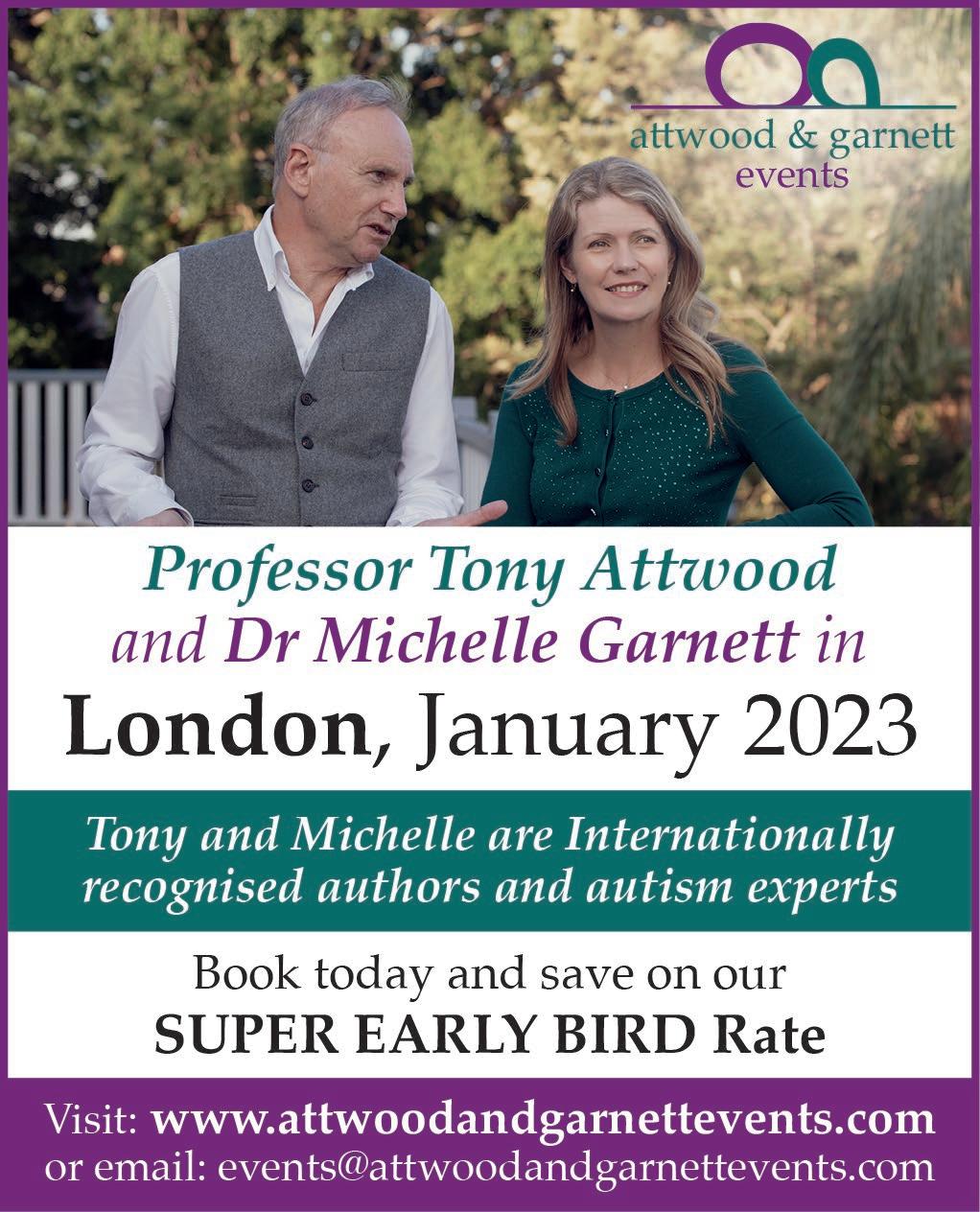
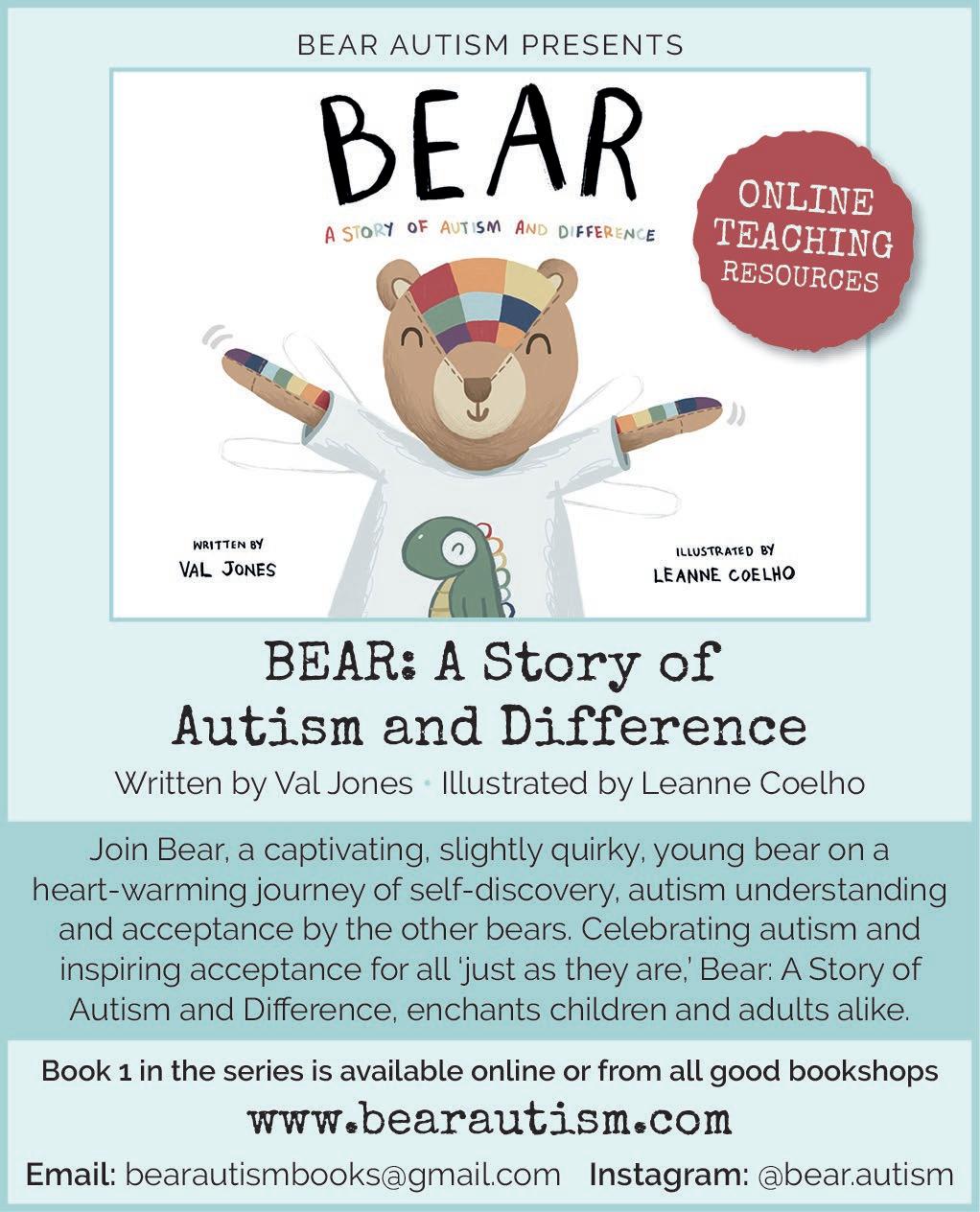
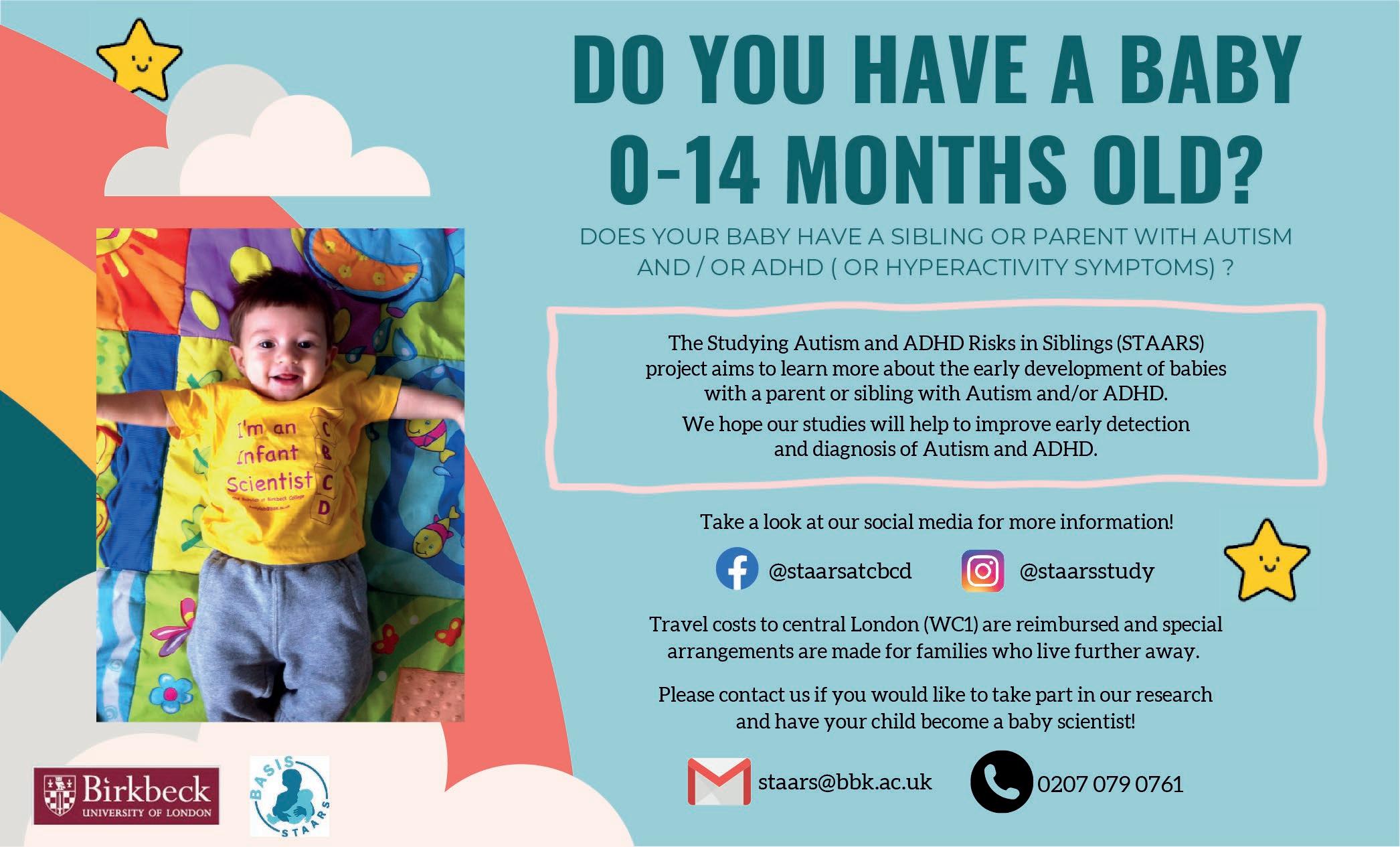
Comic relief
Tell us a bit about yourself
I’m 29 and I have a degree in Contemporary Art from Bath Spa University. I took my degree at Weston College. My focus was in animation, which wasn’t wellsupported at that time on the course, so you could say I taught myself. My hobbies include writing and illustrating fantasy fiction. I particularly love developing maps and designing unique fonts.
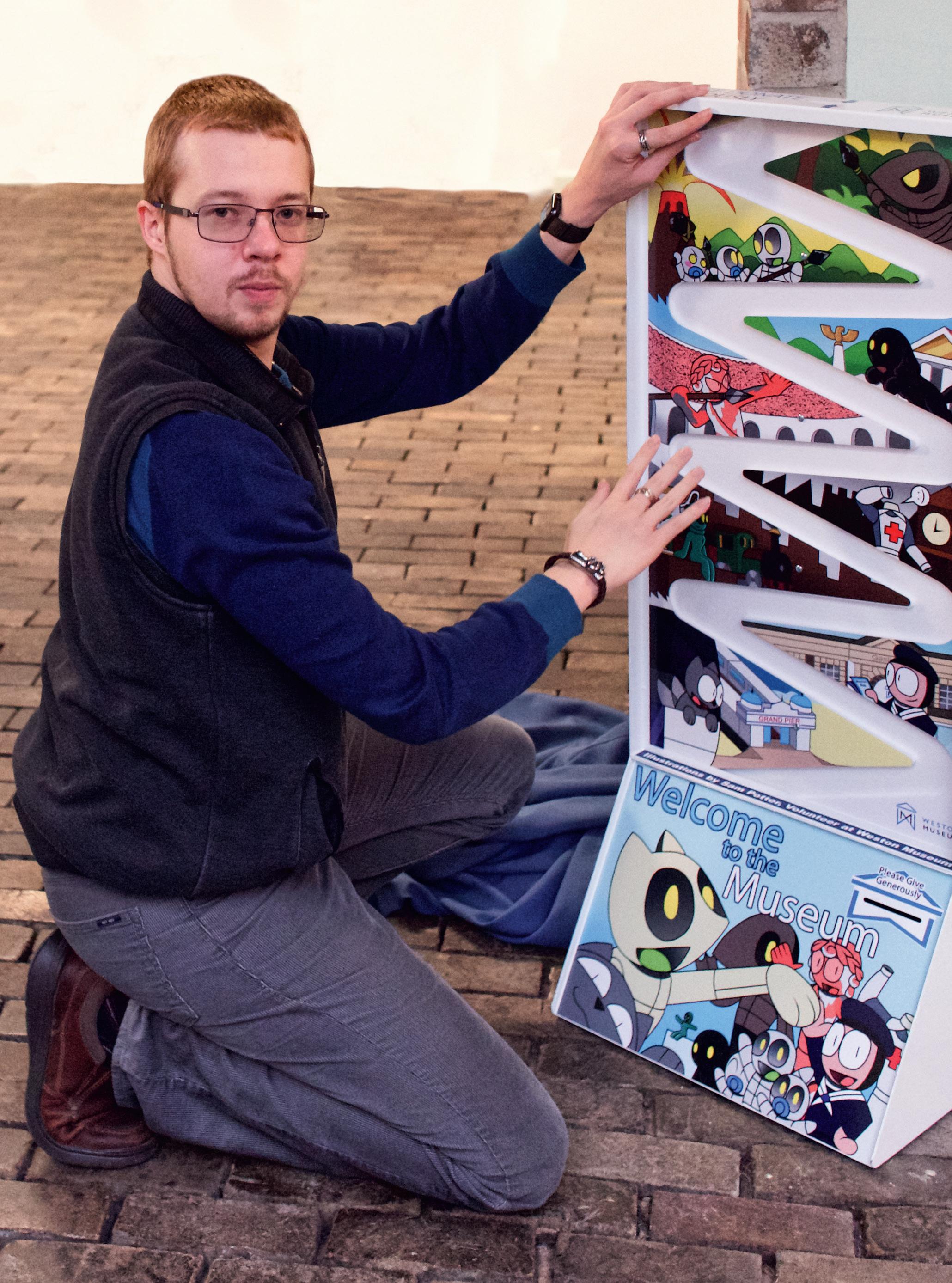
What is being autistic like for you?
To be honest, I wasn’t even aware of autism until I was in senior school. I never realised I was different from anyone else, and saw my abilities as innate skills. The clues were all around me, but I didn’t realise that I was in special classes and groups, or had personal assistance because I was atypical. I do sometimes wonder what it would be like to be “normal”, but overall, I think I am what I am: artist, writer, and all because of my autism. I would be less skilful without it.
How did you start volunteering
at Weston Museum?
After my degree, I did a two-year life-skills course at Weston College. As part of that, I did work placements and volunteering, and that’s how I started at Weston Museum in 2017. I’d tried a few places while on work
Volunteering 20 Your Autism
Sam volunteers at the Weston Museum in Somerset. After a difficult start, he has found his niche, drawing the museum’s comic strips
Sam designed the museum’s new collection box
experience. I enjoyed working at the college library, and the museum felt like it had a similar sort of atmosphere. It was a place I enjoyed walking around and there were friendly staff and visitors.
What kind of jobs do you do there?
At first, it was difficult to know what I could offer the museum. I found it hard to manage some of the tasks, such as helping at the front desk. I sharpened a lot of pencils! Actually, that was quite enjoyable and satisfying, but I think the staff weren’t quite sure what I could offer. My PA Liz Kelly, who is funded via a direct payment, has really supported me. I don’t think that the museum could have offered the level of support I needed to succeed there, so this was vital to help me settle into working there.
Liz helped them to understand my strengths as well as those things I found challenging. Eventually, I did start to find my feet and drew some illustrations for exhibitions. Plus, I started producing a regular comic strip for the newsletter; each strip showcased one of the museum’s exhibits. Then COVID happened, and the museum
started a regular series of worksheets for children, which I illustrated. I used comic characters to develop stories about different periods in history. Most recently, I was asked to design a new collection box, something eyecatching, which would encourage and reward donations from visitors.

I’m really proud of the result. I can’t imagine anyone walking past who doesn’t want to roll a coin through the ages.
There are so many things I’m proud of now. I feel what I offer is unique, appreciated and makes a difference to the way visitors enjoy the museum’s exhibitions.
What’s your advice to other autistic people thinking of volunteering?
Focus on your strengths, mind and emotions.
Strengths If you are good at art, focus on art. If maths, do something that requires those abilities. Don’t try to do something that you can’t do.
Just do what you love to do until it’s your job, then it doesn’t feel like work.
Mind Try to start off with something repetitive. If it’s a small job like sharpening pencils or making napkin crowns, you can get yourself into a momentum and turn off your higher brain to relax yourself.
Emotions This is the most critical aspect you need to focus on. Your emotions may be more or less those of a typical person, or you might find yourself in situations that will overload or overwhelm you, making you stressed, crabby, physically ill or just mentally shut down.
You should try to keep away from tasks that might cause this, but if you find yourself heading into this state, try to catch it in its early stages before it overwhelms you. Find a quiet space, and just take deep breaths for a few minutes. Maybe watch a video or listen to music until you feel better. Try to focus on the first two things, and you should be fine, but identify a safe place to relax when needed.
Want to be featured here, talking about your job or volunteering role? Email YourAutismMag@nas.org.uk
Winter 2022 21 Volunteering
Sam found his niche drawing comic strips
Not just a hobby
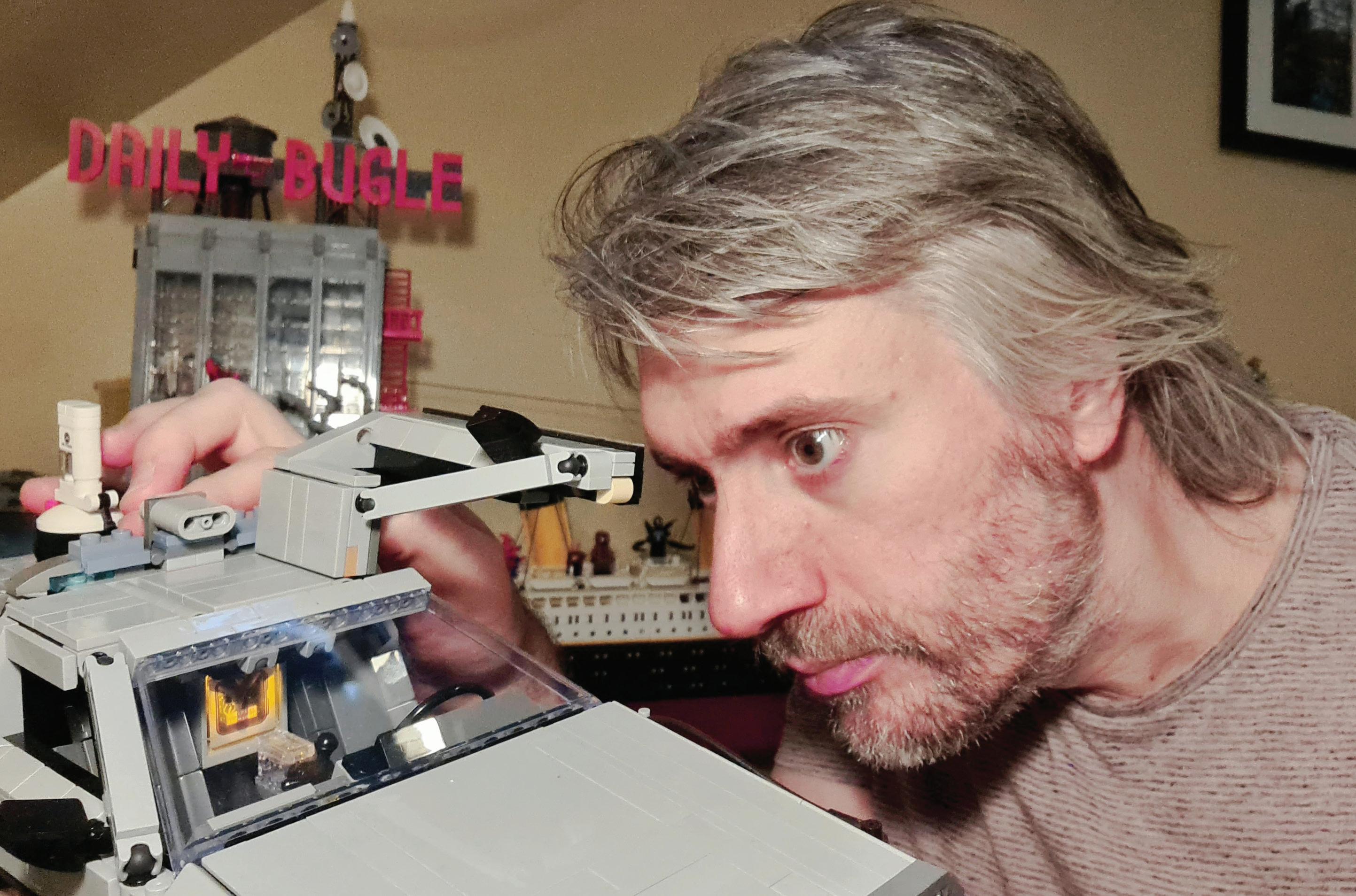
It’s an interesting thing that many autistic adults feel ashamed about their special interests. We often report having to keep them secret, or having to stop ourselves sharing information and opinions about them, or trying to divert our interests away from those we really love.
Why on earth does this happen? Why do so many autistic people feel so negatively towards things they love? After all, special interests are a huge part of the autistic experience and help us regulate our mood and stress levels, as well as giving our lives a strong sense of purpose and focus.
22 Your Autism
Autistic author, speaker and advocate Pete Wharmby explains why special interests need to be cherished
Interests
As is so often the case, the answer lies in childhood. Many autistic people remember the strong sense of shame that their special interests engendered, usually as a direct result of non-autistic people’s attitudes towards our interests and subsequently the way they treated us. You see, autistic special interests are too often viewed with suspicion, or as an aberration by non-autistic people. They are seen as somehow too impassioned, too obsessive, too focused − something unhealthy or unhelpful.
And so autistic children learn to hide them away, shut up about them, swallow them and eventually lose the hugely positive effects they can have on our lives.
Simple hobbies?
Let me outline these positive effects in a little more detail. My special interests (of which I have written a lot about in my new book, What I want to talk about) have always been deeply important to me. Before my diagnosis as autistic in 2017 at the age of 34, I assumed they were simple hobbies – albeit hobbies that I apparently needed more than other people needed theirs − but had learned in childhood that my passion for them was strange and opened me up to ridicule. But I needed them.
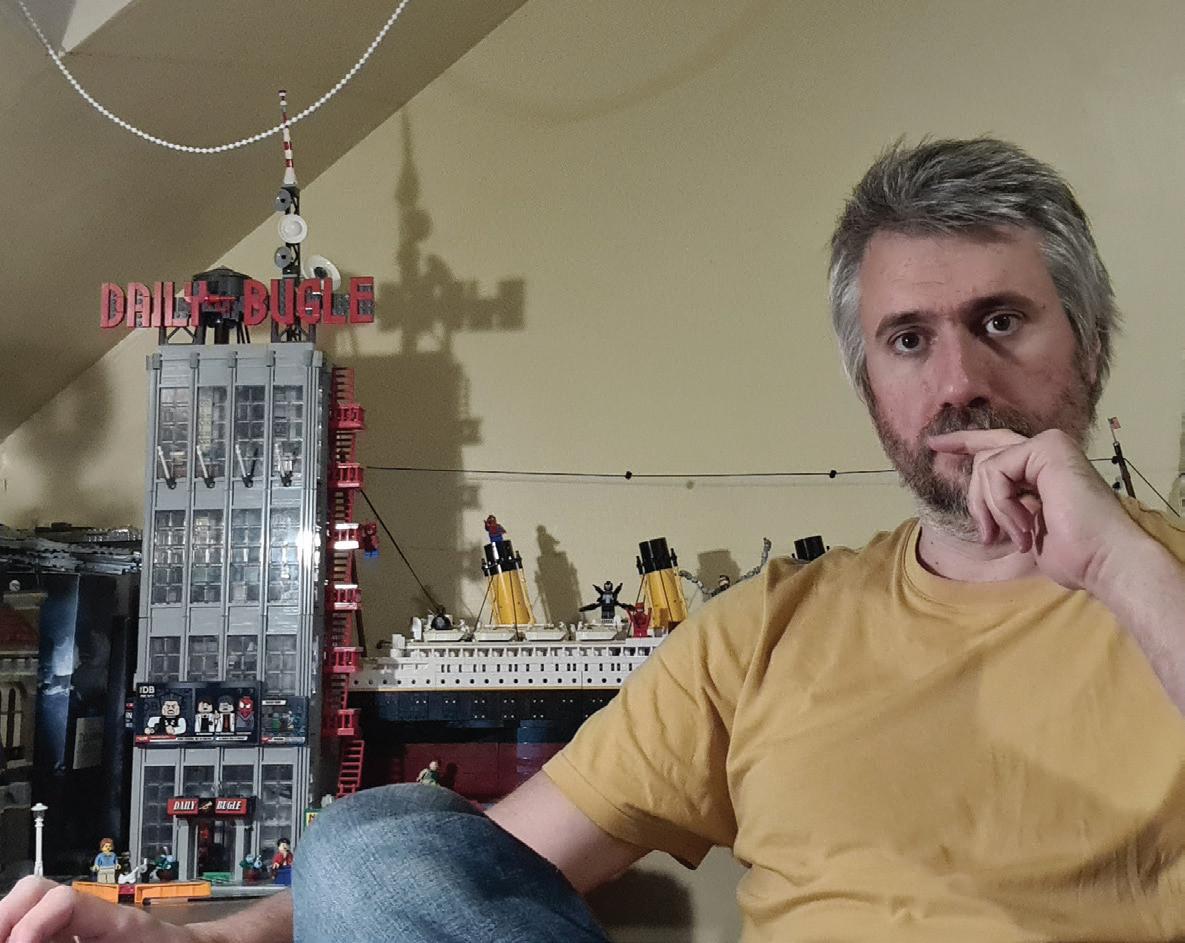
My life – like the lives of most autistic people – was extremely stressful and I used my interests to regain a sense of control and calm in a stormy, scary world. My interest in particular video games got me through the stresses of secondary school, where I would retreat into the fictional worlds of Sonic the Hedgehog and Mario to escape the sensory nightmare of the classroom. This wasn’t day-dreaming, it was a very necessary escape hatch. After all, no-one knew I was autistic and even if they did, I doubt they would have changed the environment to reduce the stressors. I needed a place to go, a sanctuary to act as a safety valve.
Luckily, I managed to do this without teachers noticing, so I ‘got away with it’. If it had been noticed and I had been punished for it, I would imagine the resentment and confusion towards the adults in the situation

Interests Winter 2022 23
Special interests are a huge part of the autistic experience
Autistic special interests are too often viewed with suspicion, as an aberration by non-autistic people
Interests
Prize draw!
We have two copies of Pete’s book, What I want to talk about: How autistic special interests shape a life, to give away to members. For your chance to win, please email your name and postal address to YourAutismMag@nas.org. uk by 20 January, quoting ‘special interests’ in the subject line. The winners will be announced in the next issue. Members can also get a 20% discount on the book by visiting uk.jkp.com/products/what-i-want-to-talkabout and entering the code ‘WIWTTAYA20’.
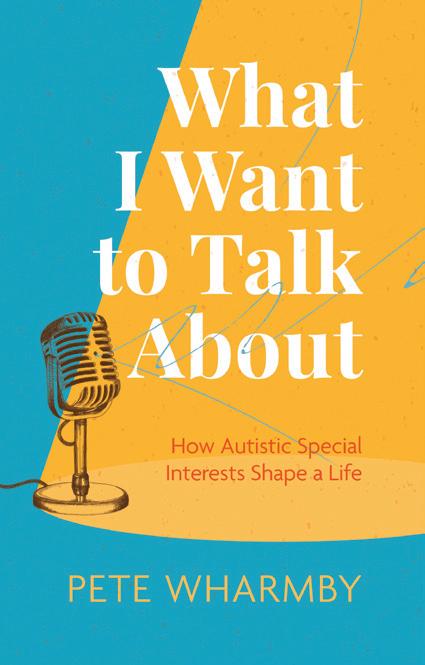
would have been extreme. After all, I wasn’t causing any harm and though I may not have been focused 100% on my work, I was (at least) not having a sensory meltdown.
More focus
But autistic children do get told off for this sort of thing. They are told to focus more, to put away their stim toys and mementos, to track the teacher and make eye contact.
Their special interests become a problem, something to be squashed, and gradually the students learn to cast them aside. Too often they aren’t replaced. As a result, the balming, comforting power is lost, along with the sense of focus, passion and purpose that the interests created.
It is of vital importance that autistic children are encouraged to embrace their interests and enjoy their strong positive effects. Parents are uniquely placed to help ensure this happens. Here are some ideas:
1. Be clear with the school that these interests bring positive effects beyond just ‘distraction’, and encourage SENCOs and teachers to engage positively with your child in regard to their interests.
2. Celebrate their interests at home. Find time to chat about them, though it may be a
good idea to make clear how much time you have for this in advance!
3. Feed their interests and don’t feel a need to excessively ‘expand their horizons’. It is natural for an autistic person to drill deep into their interests. This can lead to lifelong learning and even careers in the field.
4. If an interest is problematic or likely to lead to bad outcomes (an example could be a special interest in Nazi Germany), then keep communication channels open and try to identify the root of the interest. For example, the above interest could be rooted in an interest in military equipment. Try to gently encourage a move away from fascist examples, to avoid any potential problems.
Ultimately, the more positive we are about special interests, the more their positive effects will be felt. It can be difficult to relate to our children when they know so much about a topic that we may know very little about or indeed have little interest in, but that should not be a barrier. Let them teach you. So many autistic children I have known have found the novelty of teaching adults to be absolutely wonderful and I have learned an awful lot about all kinds of esoteric topics.
Think of the benefits of this, too – the confidence building, the communication practice, developing the skill of organising and prioritising information. These are valuable commodities for autistic children, so have them explain to you exactly why Ice-type Pokémon are strong against Dragon-type, and find the time to listen!
What are your special interests and how do they help you? Share your stories and photos on the members’ Facebook group.
Read more advice and guidance at autism.org. uk/interests
24 Your Autism
Real life
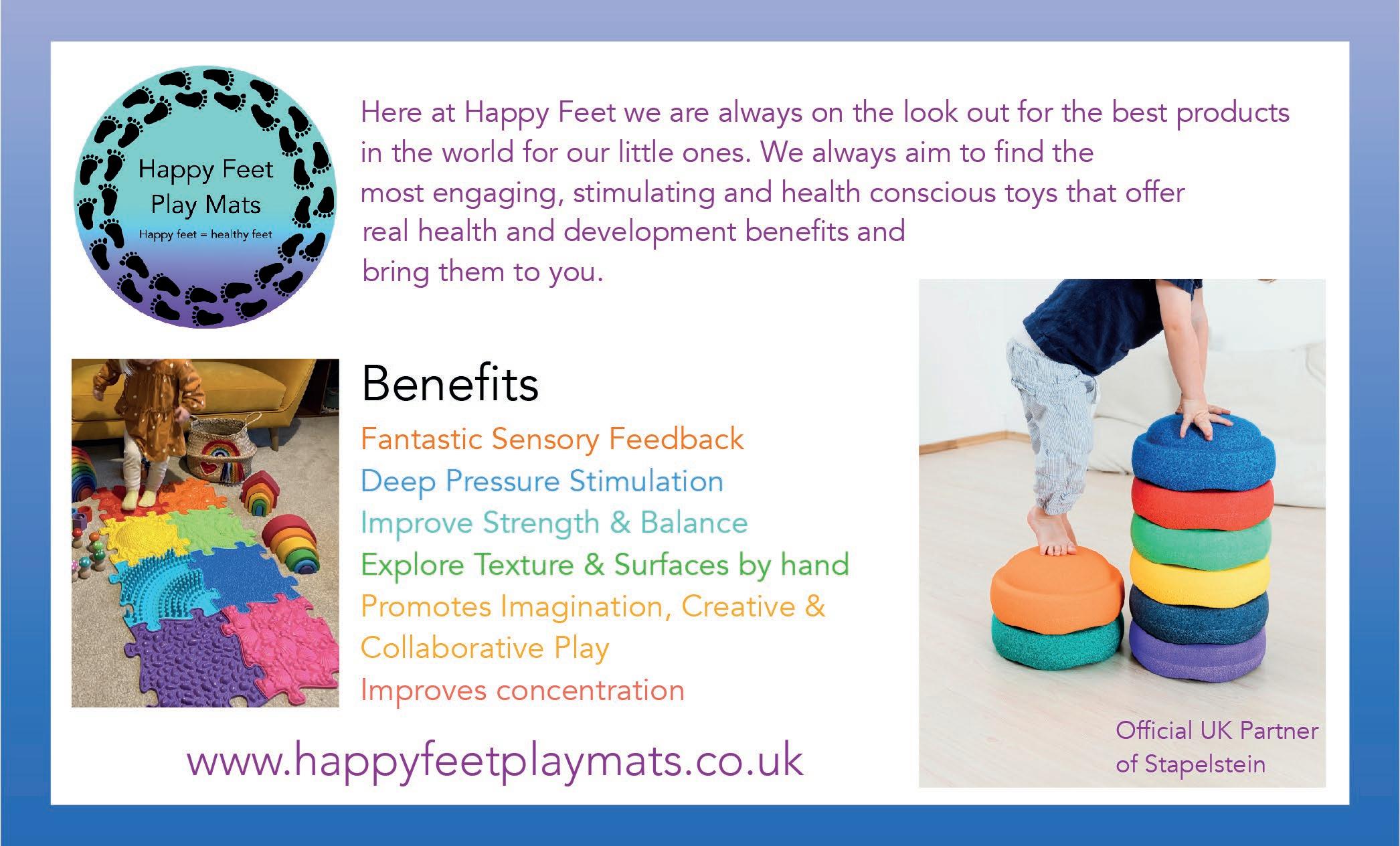

Breaking the taboos: why we need to talk about autism and menopause
Dr Rachel Moseley Professor Julie Turner-Cobb
Menopause will affect all autistic people who have periods, but it’s a poorly understood and stigmatised topic. Dr Rachel Moseley, an expert in autism, and Professor Julie Turner-Cobb, an expert in stress and health across the lifespan, discuss why autistic people and their allies need to know about menopause
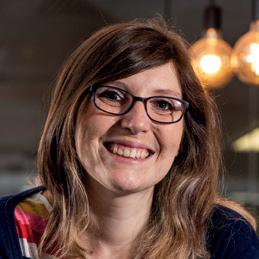
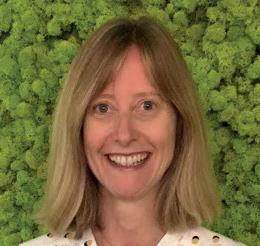
Health 26 Your Autism
iStock.com/Kroshka-looser
As many autistic people and their supporters will tell you, periods are a big deal. Autistic people say that during their period each month, life becomes “much more difficult to manage”, with heightened sensory sensitivities, overwhelming emotions, and self-care challenges. While considerable attention has been paid to supporting autistic people through the onset of periods, very little support and awareness exists to help them through the other end of the reproductive cycle, that of menopause.
The menopause is a life change or transition that occurs for people with ovaries aged around 45 to 55 years. With hormone levels wavering, periods become less frequent or irregular (this phase is called perimenopause), and eventually they stop altogether. These hormonal changes bring with them a raft of physical symptoms, such as hot flushes, insomnia, vaginal dryness and joint pain; cognitive symptoms such as difficulties with memory, attention and executive function; and dramatically heightened, changeable emotions, including low mood. Anxiety, depression and suicidal thoughts become more common during the menopausal transition. Given that autistic people struggle with change, and that many of these challenges already exist for them, what might menopause be like for autistic people?
“It all gets too much”
As psychologists from Bournemouth University, we set out to explore exactly these kinds of questions in a focus group and interviews with autistic participants.
Most autistic people we spoke to began menopause with very little understanding of what to expect. They were confused and frightened by the disruption they experienced, to the extent that one participant even asked if they were “going mad”. What was happening to them did not resemble descriptions of menopause they’d heard from non-autistic people.
During the menopausal transition, the physical, cognitive and emotional changes combine and impact one another. For autistic people, physical symptoms such as hot flushes
Carol’s story
Carol was diagnosed as autistic in her late 50s. Here’s her experience
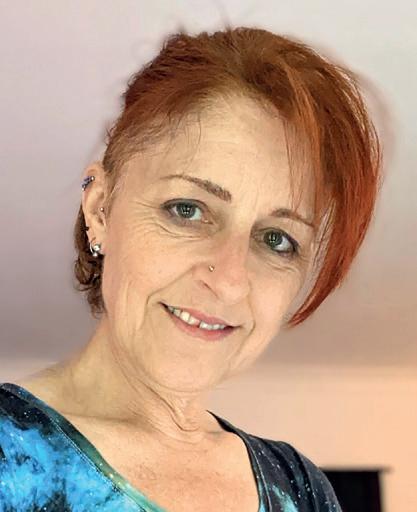
of menopause
I didn’t realise what was happening when the menopause hit me. I was tired, aching all the time, and extra stressed. I realised I also had memory and attention problems when I started missing meetings at work and forgetting what people had told me. I also had uncontrollable emotions and, though I’ve always been anxious, for the first time I experienced panic attacks.
But the new and very weird thing was hot flushes. It felt like a sudden furnace inside my middle, the waves of heat so powerful, I’d gasp. I’d be madly waving a document or fighting with my clothes, and someone would ask if I was OK. I’d reply “Don’t worry, it’s just a hot flush”, with no idea this could be awkward. It’s perfectly natural in half the population, so when I realised others were uncomfortable about it, I was confused.
But when I spoke to my GP about HRT, he was excellent. I’d had previous problems with hormones, so he offered low-dose patches, which I stick on my skin twice a week. They have calmed the mood swings and, thank goodness, stopped the hot flushes. I will continue to use them as long as I can.
impacted on sensory sensitivities, self-esteem and confidence. Insomnia contributed to heightened emotions and cognitive problems. These cognitive changes, including “brain fog” and “crushing tiredness”, were in turn linked to job loss, financial problems, and decline in daily living and self-care skills. Some participants became highly dependent on elderly parents and partners, to the further detriment of their self-worth and wellbeing.
“When you can’t describe what’s going on, you can’t ask for help”
Feeling less able to cope with social interaction during menopause, some autistic people become increasingly isolated and lonely. They told us it was harder to ‘mask’, to manage eye-contact, body language and spoken
Winter 2022 27 Health
language. This affected their relationships with friends, family, and partners.
Struggling to communicate their symptoms and how much they were suffering, our highly articulate participants often struggled to get support from doctors and from those around them. This raises serious concerns for individuals with severe communication impairments, whose discomfort and distress might not be recognised.
Our research and other studies suggest that for some autistic people, menopause is associated with severe depression, self-harm and suicidality. For some of our participants, this crisis point led to the recognition of their autism by professionals. But it seems very likely that others may get missed and become statistics in the alarmingly high suicide rates among autistic people.
What could make menopause easier?
While little is known about how to best support autistic people through menopause, our participants offered several suggestions:
● Be prepared. Knowing what to expect may take away some of the fear and confusion of not knowing what’s happening to you. Before menopause, it may be helpful to think about what’s ‘normal’ to you in terms of your body, so that you are more aware and able to tell healthcare professionals when something changes.
● Don’t blame yourself. Research suggests that autistic people might have it harder than non-autistic people. You are not ‘being weak’ if you are finding things more difficult.
● Know that menopause is different for everyone, and there are treatment options Some autistic people will have a very easy menopause. The symptoms you’re experiencing don’t have to be forever: your doctor or nurse


will be able to suggest treatments. Take a list of your symptoms and a supporter with you to your appointment if that helps.
● Gather your support network. If you can, talk to your support network (in advance if possible) so that people understand and are prepared to help. You can also direct them to sources of information around autistic menopause – see the website below.
● Connect with autistic others. It can help to share tips and advice, especially if you can connect with autistic people of a similar age. There are some great social media groups geared towards older autistic women or older autistic people (eg. on Facebook), so look to see if you can join a friendly online community.
You can read about our research at scienceonthespectrum.net
If you’re autistic and going through or have gone through menopause, you might be interested in our ongoing research in this area. If you’d like to take part in a current study we are involved in, ‘Bridging the silos’, you can read about it at autisticmenopause.com
28 Your Autism Health
iStock.com/invincible_bulldog
Studies suggest that for some autistic people, menopause is associated with severe depression, self-harm and suicidality
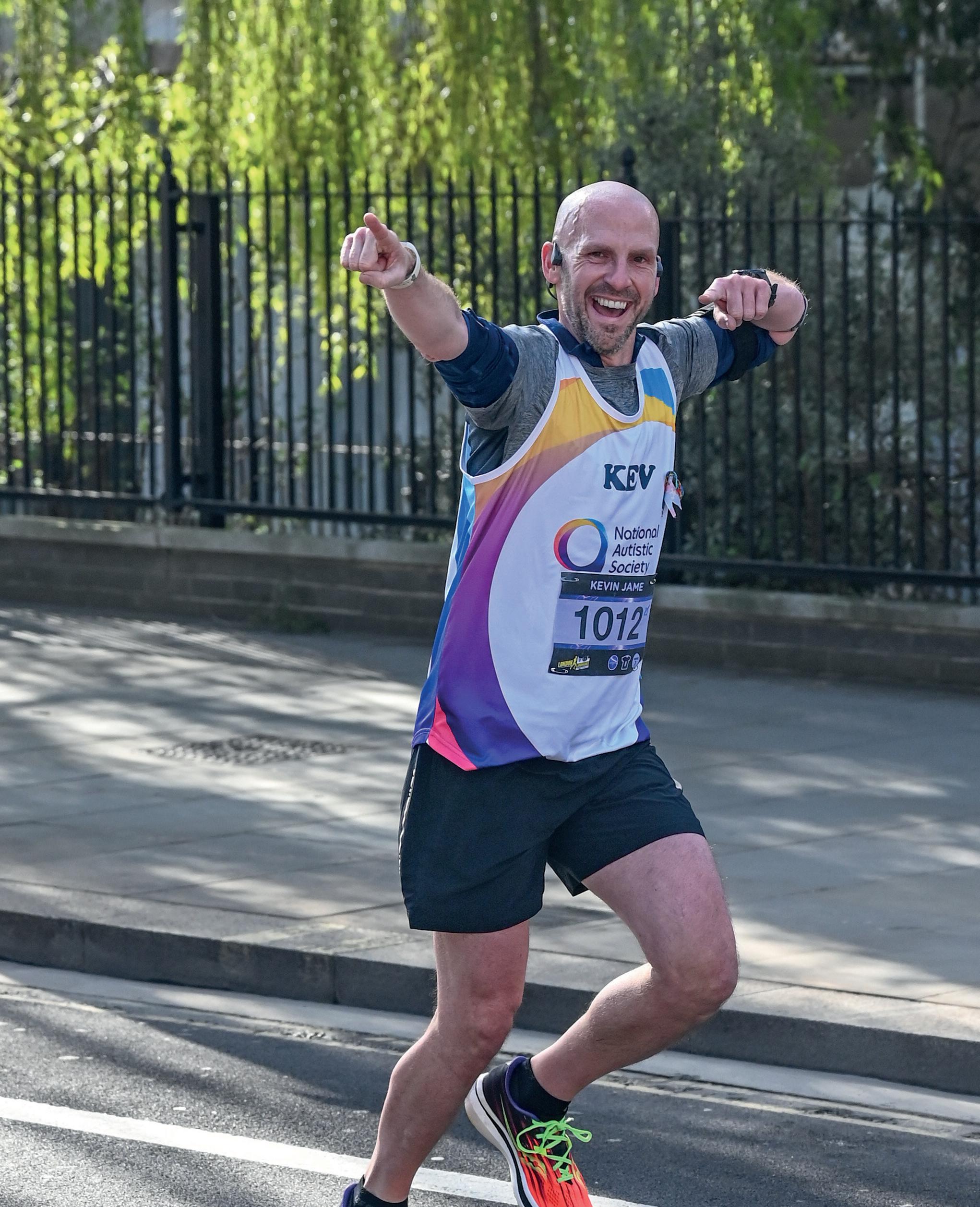






























Join us for the TCS London Marathon 2023. The National Autistic Society is a charity registered in England and Wales (269425) and in Scotland (SC039427) Apply to be part of Team Autism at one of the world’s most popular marathons and help to create a society that works for autistic people. If you are looking for a unique race, join us at London Landmarks Half Marathon 2023. Live music, theatrical performance and iconic London landmarks along the route! www.autism.org.uk/londonmarathon2023 www.autism.org.uk/landmarks
Readers to the rescue!
QI am finding it difficult when my child has a meltdown outside. She runs away, screams and tries to hit me if I go near. I feel so useless and stressed.
Post your problems or answers on Facebook at the National Autistic Society members’ group or email YourAutismMag@nas.org.uk
For extensive information and guidance about autism, visit our website: autism.org.uk
I understand how you feel as I have been there with our son. Parenting a child with any additional need is a challenge and you have every right to feel frustration and doubt. There is a process of managing meltdowns developed by Deborah Lipsky and Will Richards. It’s the S.C.A.R.E.D. model in their book Managing meltdowns
S = Safe: When your daughter goes into meltdown, it is essential that you ensure she is safe.

C = Calm: Keep calm in order to take whatever steps are needed. Your language must be calm and direct.
A = Affirmation: Reassure your daughter that you understand her distress and you are doing something to make it better for her.
R = Routine: Encourage your daughter to engage in her familiar routines. An autistic person will feel calmer in a familiar environment or routine. In our son’s case, I used headphones to play him his favourite music.
E = Empathy: You need to understand the situation
Help me next!
from your daughter’s perspective. Seek to understand why she has gone into meltdown. It is usually a sensory overload of some description.
D = Develop an intervention strategy: Meltdowns will happen. Prepare yourself and your daughter for the next one. Do you understand what the triggers are? And what routines ease her anxieties? I found this model a great help. Meltdowns happen less frequently and we have a process to resolve the situation quickly.
Paul Fraser
Thank you for your great advice, Paul. You win a copy of The kids’ guide to staying awesome and in control: Simple stuff to help children regulate their emotions and senses by Lauren Brukner.
I was diagnosed as autistic (with ADHD traits) at 38. I have a history of depression and anxiety. I have struggled for so long with keeping my home clean and uncluttered. I am a huge procrastinator, have very low motivation and if I do actually manage to do some housework, I get distracted or can’t do it for long. I get overwhelmed by everything that needs to be done. Any advice would be much appreciated. Anonymous, via our online community
AAnonymous Your Autism
Send us your solutions for a chance to win a copy of Looking after your autistic self by Niamh Garvey.
By writing to us with either a problem or an answer, you give consent for your letter to be published. We reserve the right to edit submissions.
30 Your Autism
Do you have an issue our readers can help with? Get in touch and benefit from the experience of your fellow members
iStock .com / FangXiaNuo

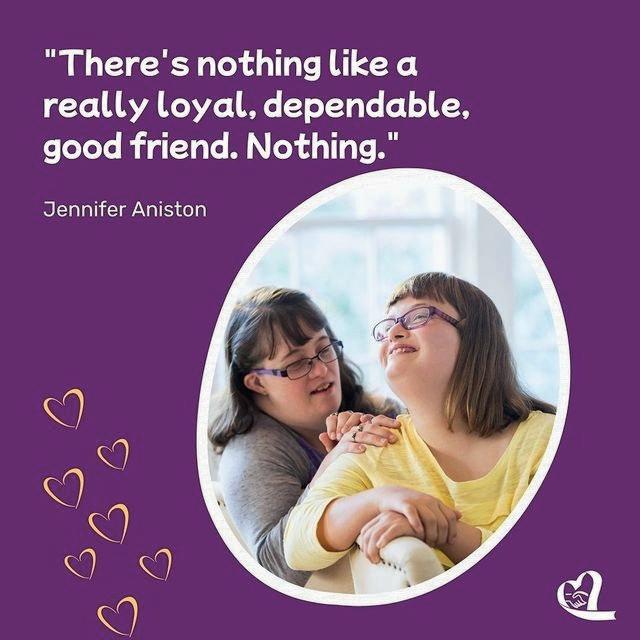
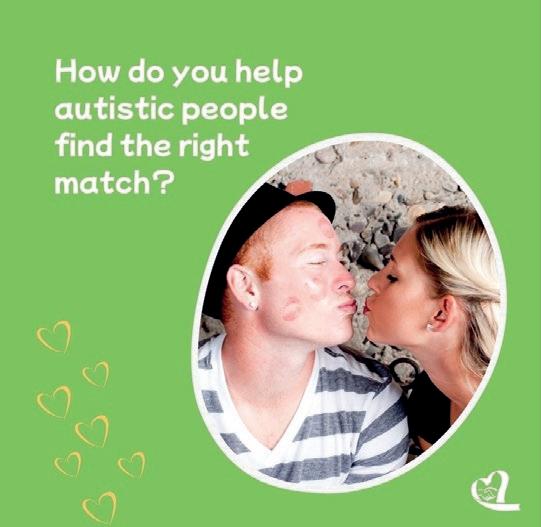
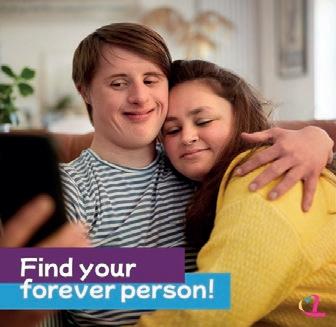

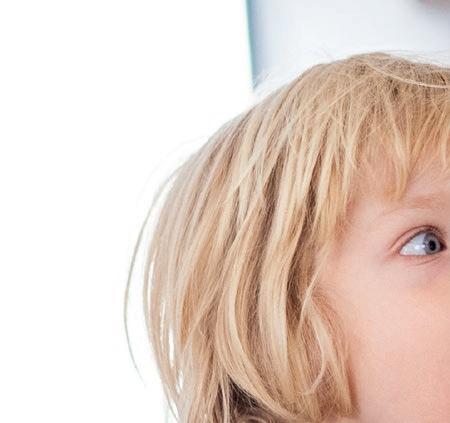


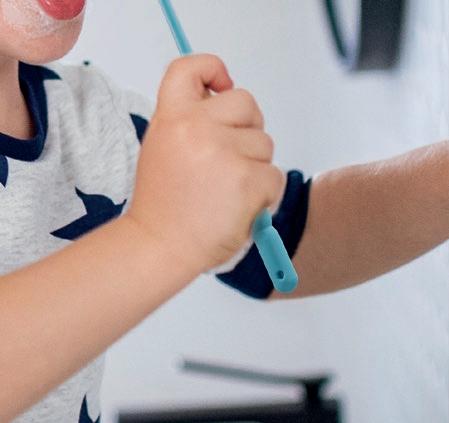

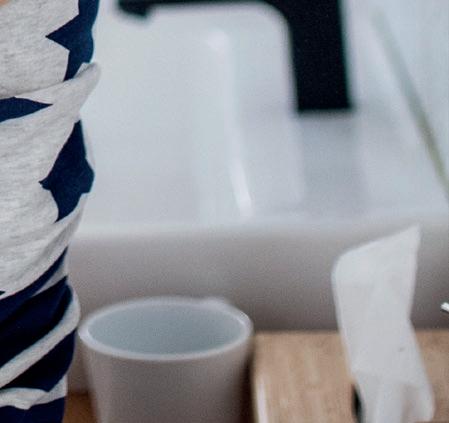

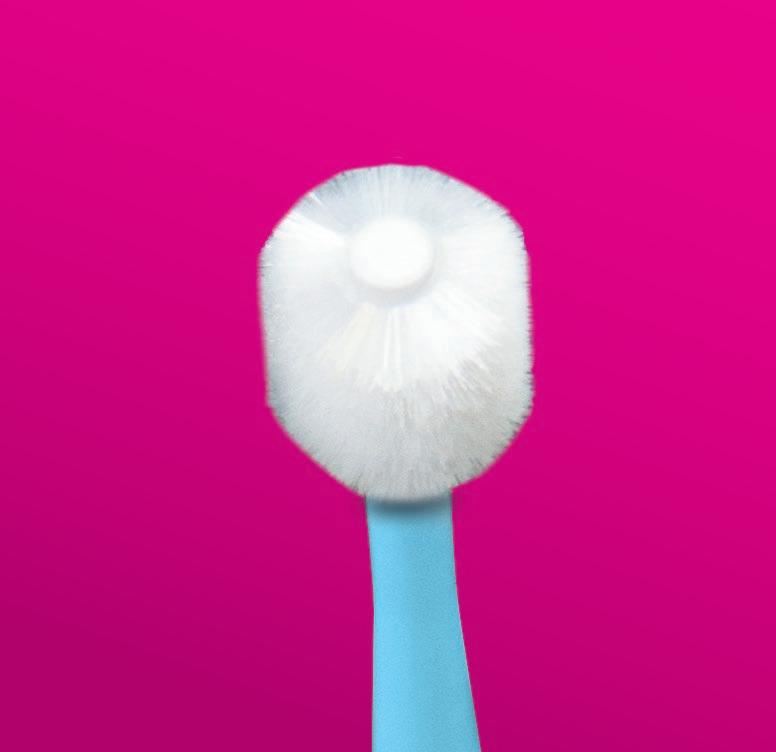












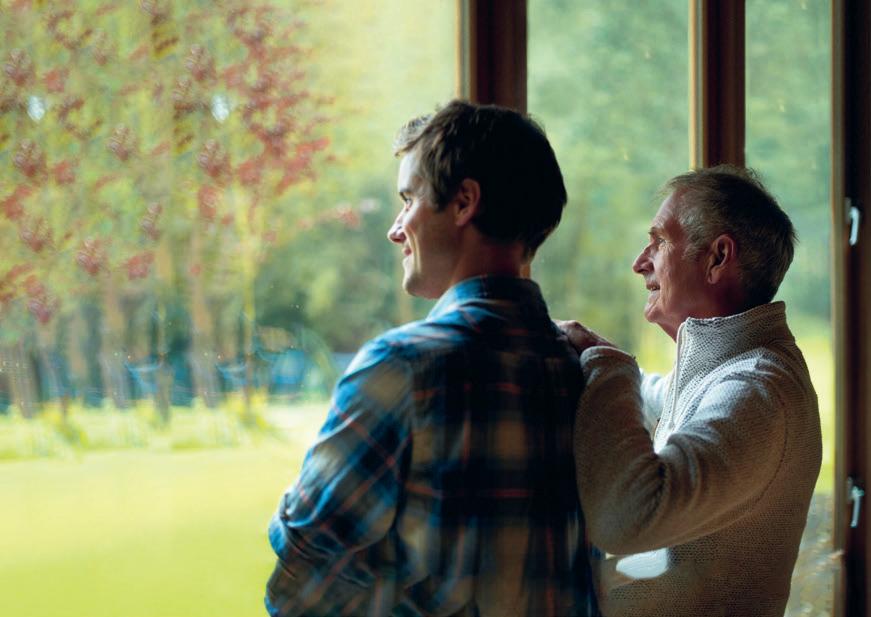



n Hertfordshire s? nds? nship? Nice 2 meet ya is Hertfordshire's first dedicated friendship and dating group for adults with learning disabilities and/ or autism Memberships fromjust £100peryear! We are a community support group and we help adults to develop and maintain new friendships and relationships Safe and private 1 1 introductions Social events and workshops Private and secure mobile app Penpal matching service And much more! For more information, please visit our website www nice2meetya com or contact us at hello@nice2meetya.co.uk or 07538 791 354 @nice2meetyaherts sabil t elationship 91 Struggling to clean their teeth? Try the Oralieve 360° Toothbrush! The Oralieve 360° Child Toothbrush allows super soft bristles to clean multiple surfaces of the mouth simultaneously, providing a gentle clean for sensitive mouths. hello@oralieve.co.uk 01582 439 122 Progress at last Been struggling with my toddlers teeth brushing and finally we’ve found a toothbrush that has helped. Lorraine W Receive 20% off our order with us by using code YOURAUTISM20 at checkout from our online store! www.oralieve.co.uk SM3315 Oralieve Autsim Half Page Ad 1 PRINT.indd 1 11/08/2022 11:12 The National Autistic Society is a charity registered in England and Wales (269425) and in Scotland (SC039427) Did you know you can remember the National Autistic Society with a gift in your Will? legacies@nas.org.uk For a free information booklet, please email or call 0808 800 1050
What to do… if your child has contact with the police
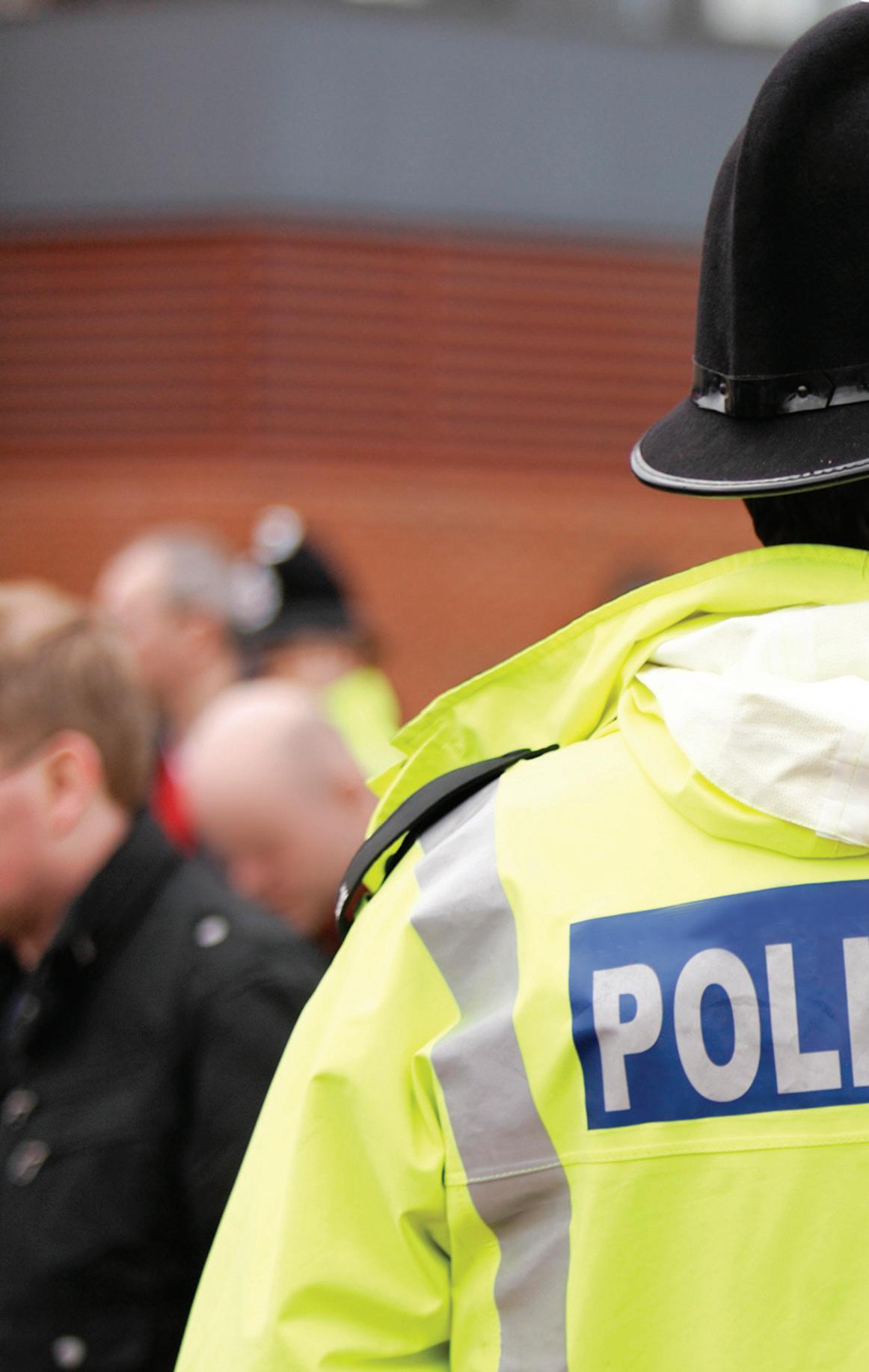
The vast majority of autistic people won’t come into contact with the criminal justice system. But if they do, and that might be as a witness, victim or offender, Clare Hughes, Criminal Justice Manager at National Autistic Society, has this advice
Disclose autism to get the right support
Autistic people are entitled to support and reasonable adjustments from the police. But these can only be provided if the police know or suspect someone needs that support. Encourage your child to carry an identity card, such as the Autism Alert Card. This lets people know they may need some extra help. Check if the police force in your area has their own autism card or equivalent. These can help the police understand the best way to communicate with your child. They are particularly important for those who may become non-verbal when under stress or whose needs may not be obviously apparent. If they don’t carry a card, explain the benefits of disclosing that they are autistic to the police.
Keep all the written information you have about your child, for
example, their diagnosis and any specialist reports written about them. These may be useful.
Get support from an Appropriate Adult
(AA)
Under the Police and Criminal Evidence Act, autistic suspects in police detention who may have difficulty understanding or responding to proceedings are entitled to the support of an Appropriate Adult (AA).
The AA may be a friend, family member, or professional and their role is to support, advise, and assist the detainee to ensure they understand what is happening at the police station during the interview and investigative stages. They may also facilitate communication between the detainee and police, and will make sure the rights of the detainee are respected.
Use intermediaries
An autistic person who is a victim, witness or offender is entitled to support from an intermediary; an impartial expert in communication who can assist the police and the court in obtaining evidence.
An intermediary’s role is to conduct an assessment of the autistic person’s communication needs, and provide person-specific recommendations about:
● how police and the court can communicate information and questions effectively and appropriately (before and during questioning)
● how best to communicate when preparing the person for the various stages of the criminal justice process
● how to monitor and manage anxiety associated with giving evidence where it impacts upon communication
Advice 32 Your Autism
iStock.com/ andrewmedina
● how to appropriately use communication aids and/or devices to support communication.
Ask for reasonable adjustments
Tell the intermediary or AA what particular sensitivities, triggers and other stressors your child may experience and what reasonable adjustments can be put in place. Some examples are for the police to use clear language during questioning, give more time to process information, provide easy read forms and to tell the person in advance what to expect. You could ask if the police could conduct interviews in a familiar environment such as home. Your child should also be allowed to stim and to keep calming objects with them during interviews.
Further reading
● Read more advice at autism.org.uk/cjs
● “My life could be so different”: Experiences of autistic young people in the youth justice system. Our latest report explores why autistic young people are at risk of getting involved in the criminal justice system and how the system can better support them. Read more on page five and at autism.org.uk/youthjustice.
● Autism: a guide for police officers and staff (2020). National Autistic Society, autism.org.uk/policeguide
● Our Autism Alert Card is available at autism.org.uk/shop
● Read Dr Katie Maras’ article on police interviews with autistic people at autism.org.uk/police-interviews
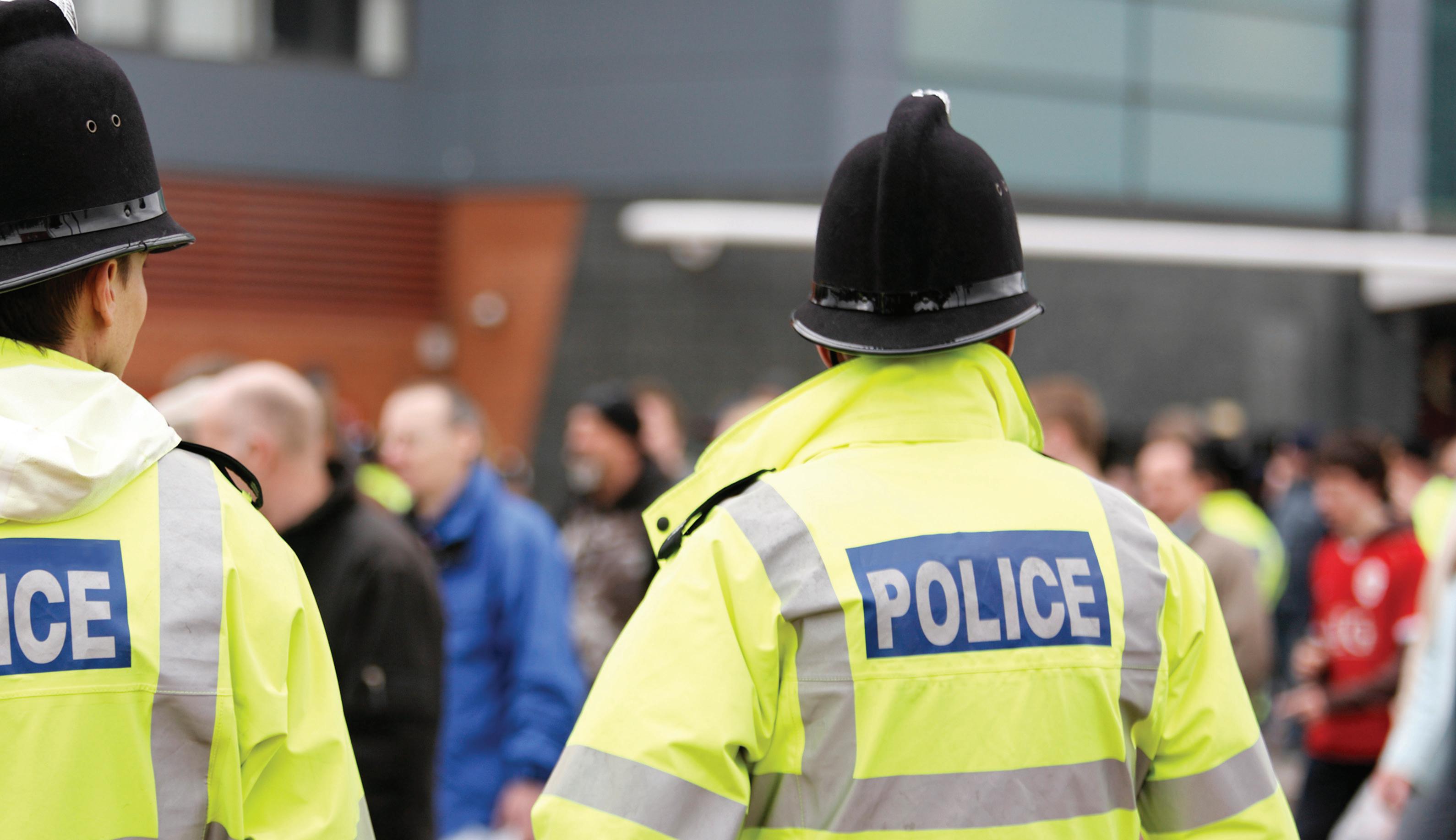
● The Advocates Gateway (2016): Planning to question someone with autism spectrum disorder including Asperger syndrome bit.ly/advocates-gateway
● The equal treatment bench book bit.ly/equal-treatment-bench-book
Winter 2022 33
Advice
Preparing for puberty

34 Your Autism Advice
Lorraine MacAlister, one of the authors of our Teen Life programme, sets out how you can get your child ready for puberty
It can feel daunting to start teaching your autistic child about puberty. They might be physically developed and approaching puberty, but socially and emotionally at a younger stage. They may struggle with understanding why things start changing as they get older.
But talking to your child is crucial. Many teenagers learn about puberty from their peers, the media and the internet. Difficulties with social interaction might mean your child doesn’t pick up as much information from their peers. They might also take information they see or read very literally and need you to explain it to them.
When to start?
Some parents start talking about puberty at the same time as their child’s school teaches it. By working with the school, you will help to ensure consistency between school and home explanations.
However, you might decide that these lessons are paced inappropriately for your child. Perhaps they progress too fast and assume too much prior knowledge, or don’t start at an early enough age. Autistic children often need longer to adjust to and understand any changes in their lives.
Your child may do things that might be judged differently by others as a teenager or adult, for example removing their clothes at unexpected moments. It may be easier to address these behaviours before puberty begins.
Key skills to develop during puberty:
● washing regularly
● washing key parts of the body
● wearing deodorant
● learning how to shave underarms and legs, if desired
● shaving the face, if desired
● wearing a bra
● skin care for spots
● tampons, towels and sanitary care
● understanding about erections and wet dreams
● understanding about masturbation
● understanding the difference between public and private.
Our advice
Before you start, you need to be clear about what you want to teach your child. It is important to think about your own values and beliefs, and how these will impact on what you are wanting to help your child understand.
Information given needs to be clear and easy to follow. It is vital that the information we provide to autistic children is appropriate for their level of understanding and is very clear and easy to process. Answer any questions honestly. This can help them learn that puberty is not something to be embarrassed about and that they can trust you to give them the right information and support.
Be careful how you use language. Saying that your son’s voice is ‘breaking’ could be very worrying for an autistic teenager who may take it literally. Instead, you could say that their voice is ‘changing’ and likely to become deeper.
Many autistic adults strongly recommend using the correct names for body parts. You may
want to explain that there are different names for private body parts, and that the words you are using might be different to words your child might hear other young people say. You should also explain some of the social etiquette about what to call different parts when talking to different people.
For example, we might use medically correct terminology at the GP surgery, but stick to slang terms with our friends.
Explaining physical changes. Many children and teenagers find it helpful to have access to visual supports to explain the basics of development, such as:
Photos – you could show your child photos of yourself and other family members at different ages, to help them to understand when puberty happens in a person’s life.
A body outline – labelling all of the body parts and highlighting how each part will change and talking about what fluids come from each part. For example, sweat, tears, urine, semen, menstrual blood and vaginal discharge.
Advice Winter 2022 35
iStock.com/ MstudioImages
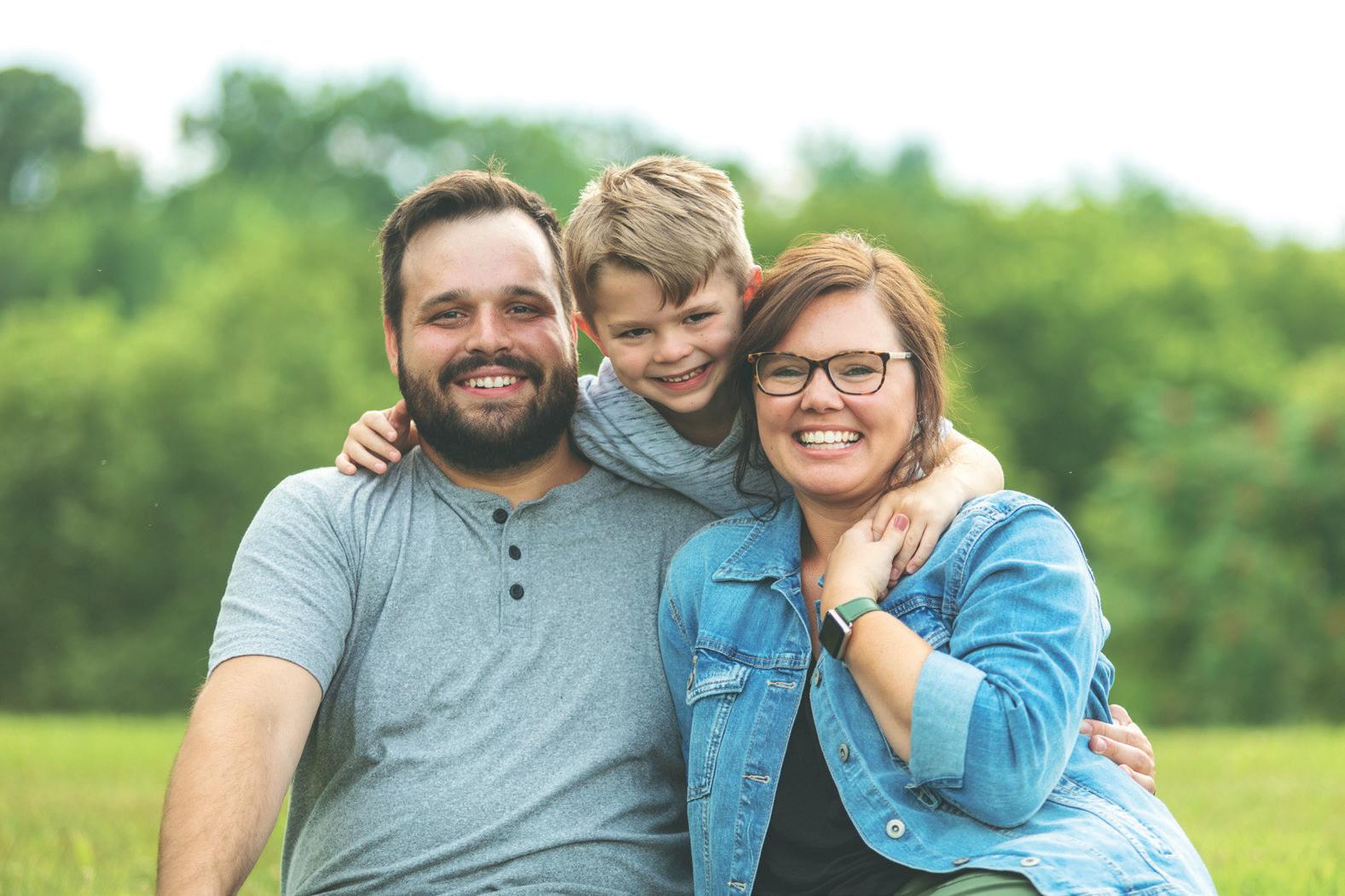



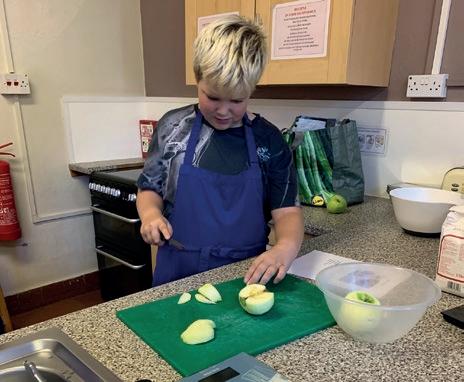
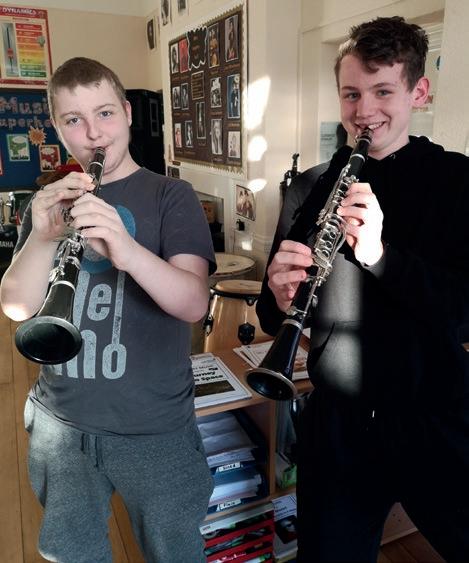
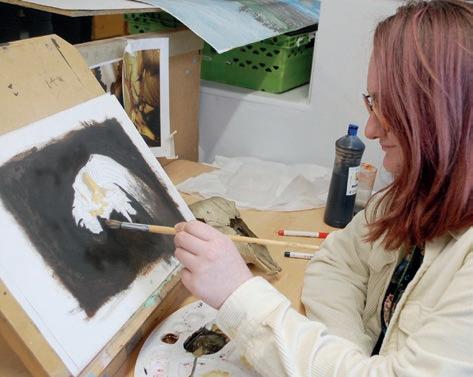


Help us be there for autistic people when they need us most. Play today for just £1 a week Join online now: autism.org.uk/lottery Or call our lottery hotline: 0370 050 9240 The National Autistic Society is a charity registered in England and Wales (269425) and in Scotland (SC039427) Exceptional Schools for Young People with Autism Alderwasley Hall School & Sixth Form, Derbyshire Aran Hall School, Dolgellau Bladon House School, Staffordshire Maple View School, Derby Pegasus School, Derbyshire Rowden House School, Herefordshire Senadgroup.com Tel: 01332 378840 SENADgroup
It is important to encourage your child to feel positive about these changes by talking about some of the advantages of being a teenager and adult. For instance, that teenagers can decide how to have their hair cut, what to wear and that they can vote... whatever will appeal to your teenager.

Personal hygiene. You will need to prepare your child for the need to wash more often, shave if desired, and use deodorants. Explain how to do these things, as well as the social rules determining why we do them. A social story might be useful.
If your child has already established a routine or tick list for their morning schedule, you could adjust it to include the use of deodorants, showering every day, shaving every other day, and so on.
Menstruation. Your child may need reassurance that menstruation is a normal biological process. Use visual supports to explain what to do and to provide reassurance. Make sure they know who to go to at school if their period starts. Keep sanitary products in a particular drawer in the bedroom or bathroom. A calendar or period tracking app will help them know when a period is due.
Public and private places. It is vital for autistic teenagers to understand what can be done in public and what should only be done in private. You can use lists, pictures or photos of places that are public and private
to help explain this concept. Having a culture of knocking on bedroom doors and keeping doors shut when using toilets or bathrooms will reinforce their understanding.
Who can see and touch my body. On a body chart, use colours to draw where other people can touch you. You could perhaps use colour coding. Different charts should be used for different people (including doctors and parents, siblings, friends, teachers and people you only know a little bit, such as strangers).
Next steps
Some really useful books for teaching your autistic child about puberty include the following:
● Autism: supporting your teenager by Caroline Hattersley (2014)
● What’s happening to Tom? and What’s happening to Ellie? by Kate Reynolds (2015)
● The growing up book for girls and The growing up book for boys by Davida Hartman (2015)
● The autism-friendly guide to periods by Robyn Steward (2019)
● The awesome autistic go-to guide by Yenn Purkis and Tanya Masterman (2020)
Read more advice and guidance at autism.org.uk/puberty
Find your nearest Teen Life course at autism.org.uk/teenlife
Winter 2022 37
Advice
You will need to prepare your child for the need to wash more often, shave if desired, and use deodorants. Explain how to do these things as well as the social rules determining why we do them
iStock.com/ Courtney Hale
Notebook
Everything you need to read, do or see
I used to be famous Netflix
VERDICT: Uplifting film, starring an autistic actor
This feelgood film follows the story of Vince, played by Ed Skrein, who used to be in a chart-topping boy band before finding himself alone and struggling. He becomes friends with autistic drummer Stevie, portrayed by Leo Long, after an impromptu music jam on the streets of Peckham.
Before making his screen debut in the role of Stevie, folk musician Leo Long performed with the London Youth Folk Ensemble and National Open Youth Orchestra. Diagnosed with a speech and language condition as well as autism, Leo has said he is determined to make the industry more ‘peoplefriendly’ for disabled musicians and actors.
The National Autistic Society provided guidance throughout the film’s production process. Our charity’s Leo Capella said: “Representation on screen matters. The film is not a non-disabled person saving another disabled person, which is brilliant.”
If you’re looking for a heart-warming film this winter, I used to be famous is the one to watch.
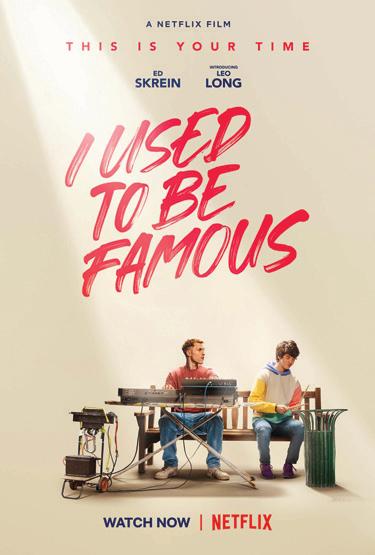
Suzanne Westbury, Editor of Your Autism magazine
Prize draw
We have a copy of Letters to my weird sisters to give away to one member. For your chance to win, please email your name and postal address to YourAutismMag@nas.org.uk by 20 January 2023, quoting ‘Letters’ in the subject line. The winner will be announced in the next issue.
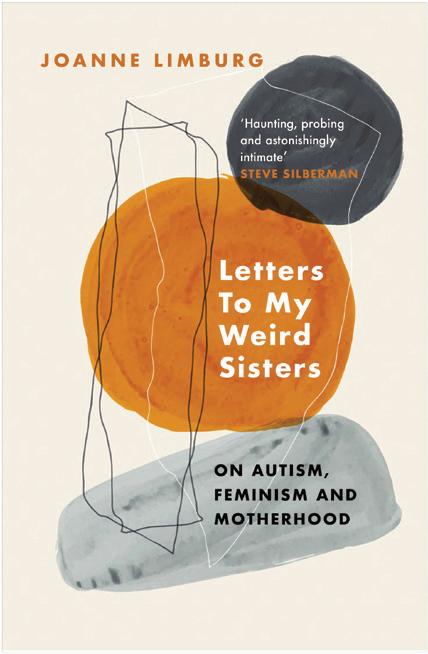
The winner of last edition’s giveaway for a copy of Championing your autistic teen at secondary school is Valerie Fitch. Congratulations!
Letters to my weird sisters
AUTHOR:
Joanne Limburg
PUBLISHER: Atlantic Books
PRICE: £15.99
VERDICT: A must-read original book
Joanne Limburg’s book for parents is mostly a tale of her struggle with notions of autism, feminism and motherhood. The sisters of the title are Virginia Woolf, Adelheid Bloch, Frau V and Katharina Kepler. They share a commonality, but there is a fifth woman, Caron Freeborn, well-known in her short life as a charismatic literature teacher at Cambridge. What the first four have in common is a way of looking at the world and the way the world has treated them as children and adults. The fifth, Freeborn, writes of poetry and much else of the ‘autistic’ line.
Bloch is a Jewish child with disabilities, murdered during the Holocaust; Frau V is the mother of Fritz, one of Asperger’s children; and Kepler is mother to the famous Johannes Kepler, who defended her in a celebrated 17th century trial on charges of witchcraft. Woolf is the famous Bloomsbury writer whose novels and expressive prose, argues Limburg, go with then-undiagnosed and unrecognised autism. Centuries may separate these women but their stories have much in common. They were ‘different’; they were ‘weird’.
Joanna Limburg is also an accomplished published poet. Her last verse collection The autistic Alice (Bloodaxe Books) appeared in 2017. Particularly impressive is the poem she wrote in response to another parent’s poem, It allows a portrait in line-scan at fifteen, by the great Australian poet Les Murray. Do read both for wisdom on autism and please read this original book. This old player regards it as essential.
Michael Baron, one of the founders of the National Autistic Society
38 Your Autism
Love on the spectrum US
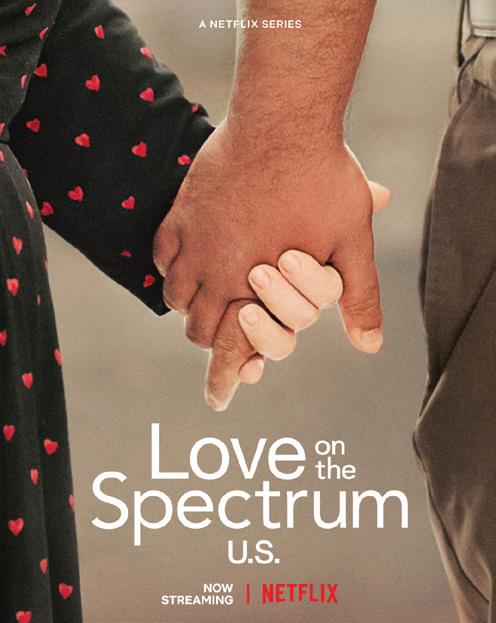
VERDICT: A dating show that gets it just
right
Focusing on six autistic adults, this reality series succeeds in portraying the struggles and successes of the show’s stars without infantilising them. A highlight for me was that the show’s autism expert was herself autistic and provided peer support, which
Our
empowered the people she met to date without changing who they are.
Love on the spectrum US also seems to hit a great balance between interviews with the show’s stars (which give them the platform they deserve), while also including their friends and family enough so that we can see the support network around them.
Nellie Allsop, Senior Branch Engagement Officer at the National Autistic Society
favourite… pantomimes (relaxed performances)
1 Sleeping Beauty
FTH Theatre, Falkirk Wed 14 Dec, 7pm
Come and see the magical family-friendly pantomime Sleeping Beauty falkirkleisureandculture. org/whats-on/sleepingbeauty
Starring Jason Manford as Captain Hook,
Peter Pan as he sets sail on a brand-new adventure. atgtickets.com/venues/ opera-house-manchester
3
Jack and the Beanstalk
Anton Du Beke. churchilltheatre.co.uk
4
Cinderella Bristol Hippodrome Theatre Fri 16 Dec, 2pm


2The
Pantomime Adventures of Peter Pan Opera House, Manchester Thurs 15 Dec, 1pm
Churchill Theatre, Bromley Thurs 15 Dec, 1.30pm
Promising to be a ‘strictly’ magical adventure this Christmas, Bromley’s panto stars
A panto packed with laugh-out loud comedy, stunning scenery and Craig Revel Horwood! atgtickets.com/shows/ cinderella-relaxedperformance/bristolhippodrome
5 Beauty and the Beast
Venue Cymru, Llandudno Wed 28 Dec, 2pm
Starring CBeebies’ Rebecca Keatley as Belle, this is just one of Imagine Theatre’s accessible performances running in theatres across the UK this Christmas.
venuecymru.co.uk/ beauty-and-beast-0
6 Snow White
Cliffs Pavilion Palace Theatre, Southend Sat 31 Dec, 11am
With Ashley Banjo and Diversity, Snow White and the Seven Dwarfs will be spectacularly brought to life. southendtheatres.org.uk
Please
Winter 2022 39 Notebook
join
Do you have an idea for our six favourites section? Email us at: YourAutismMag@nas.org.uk
six
note: Our Snapshot feature will return in Spring 2023
